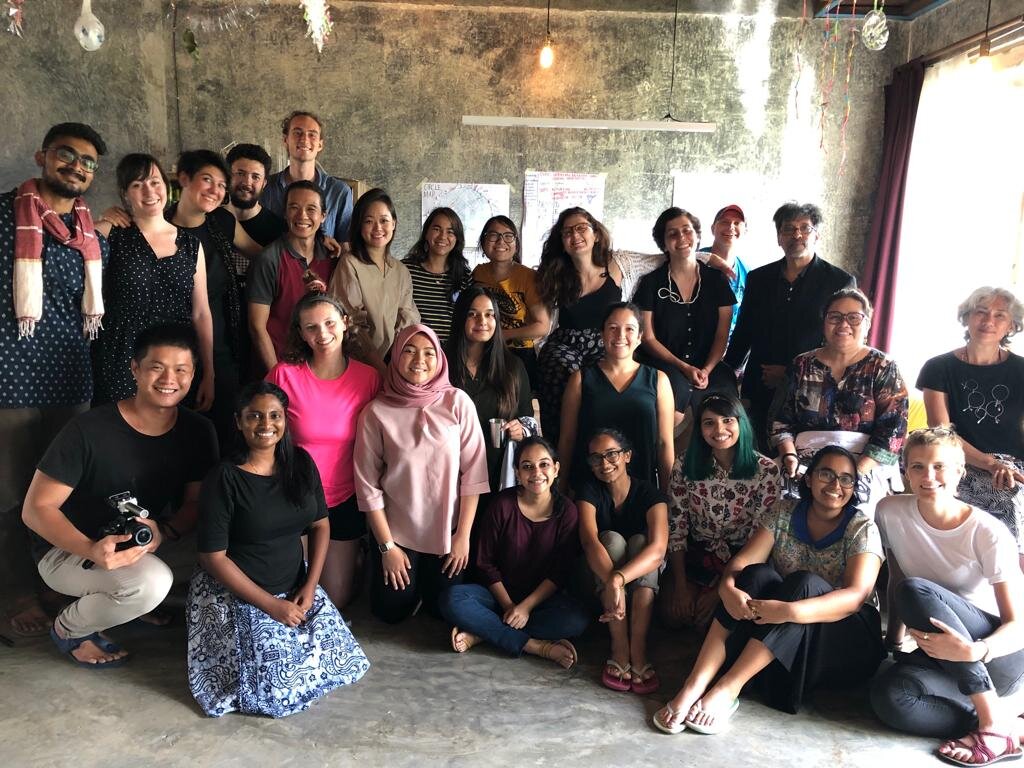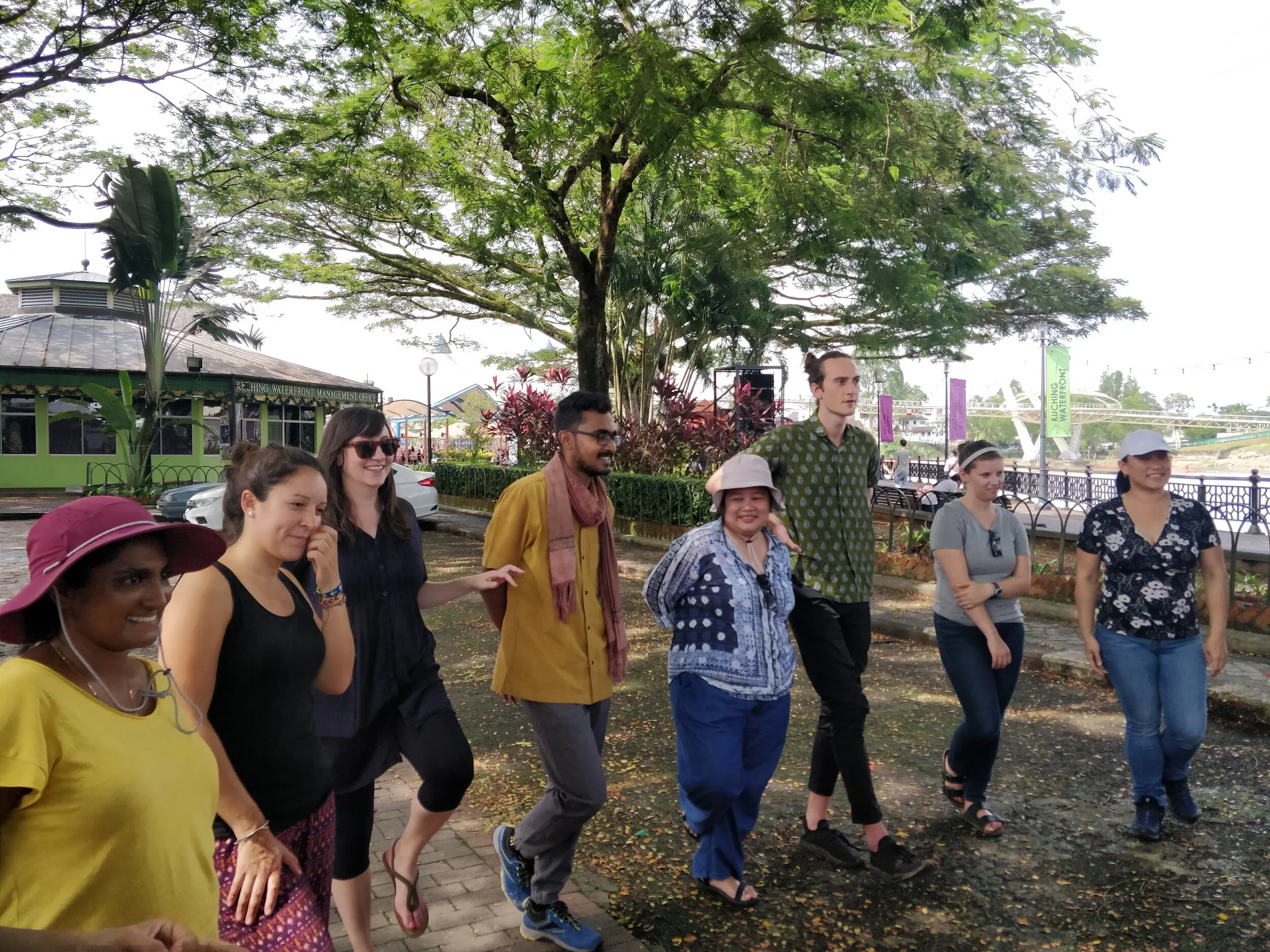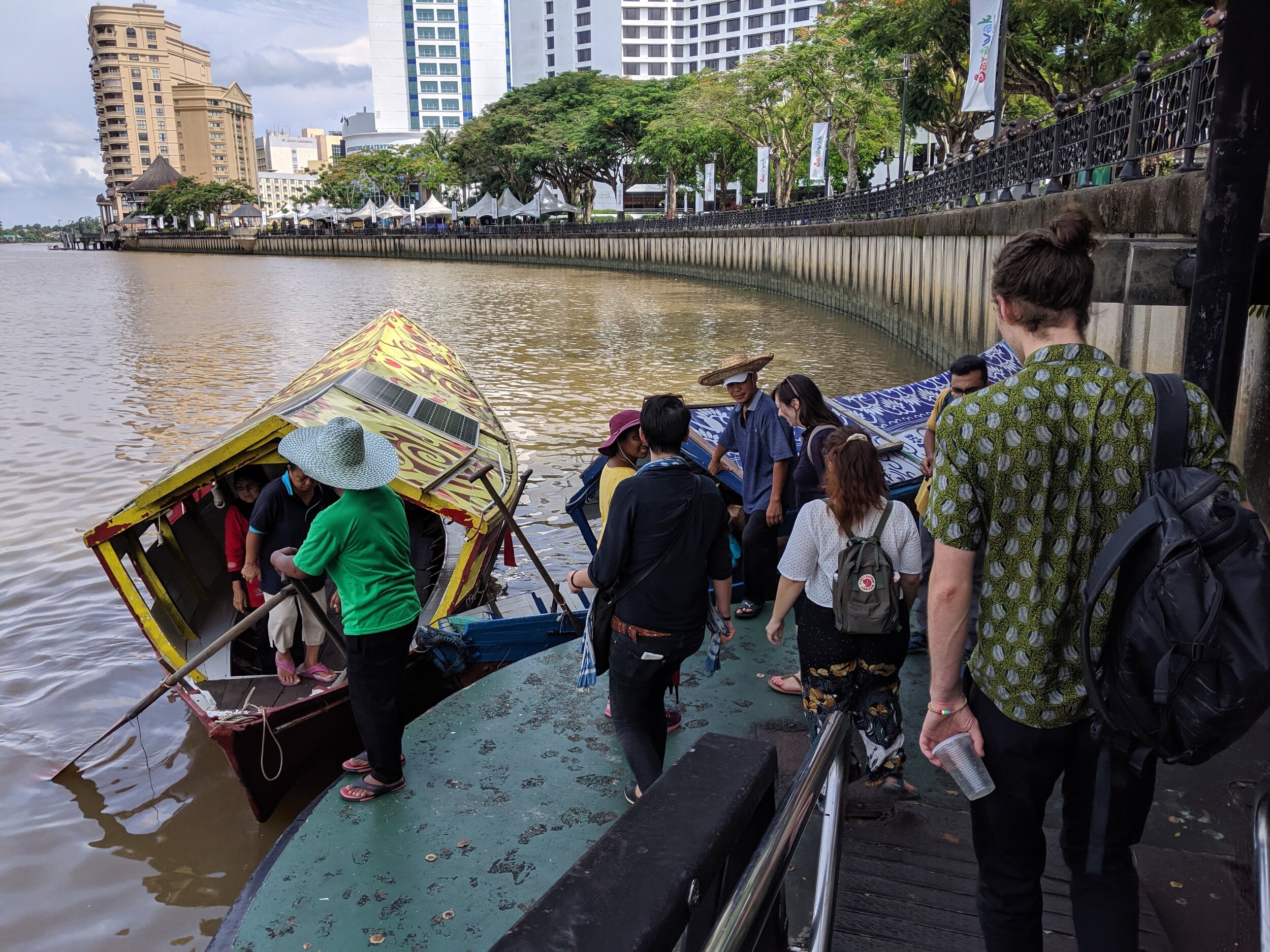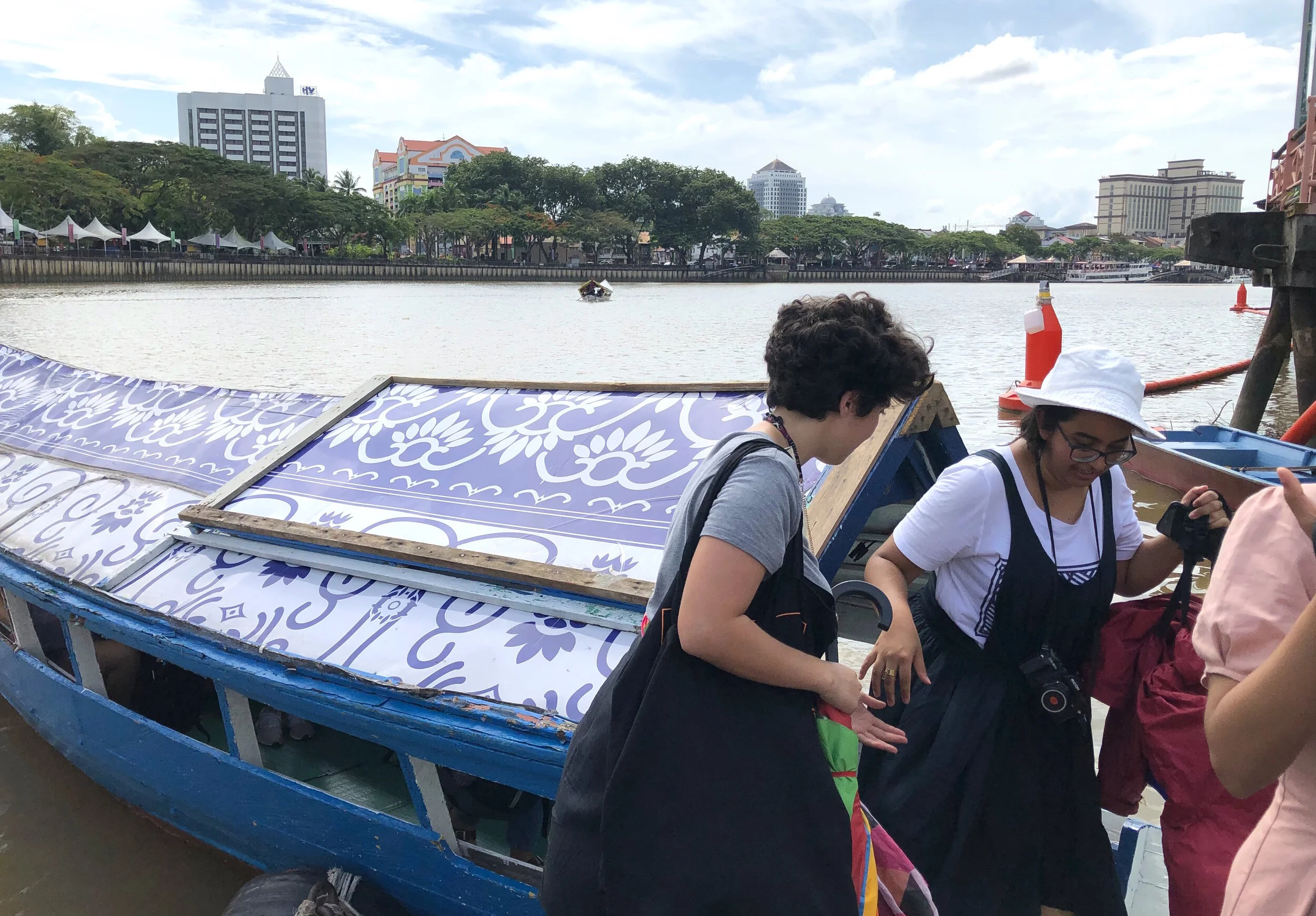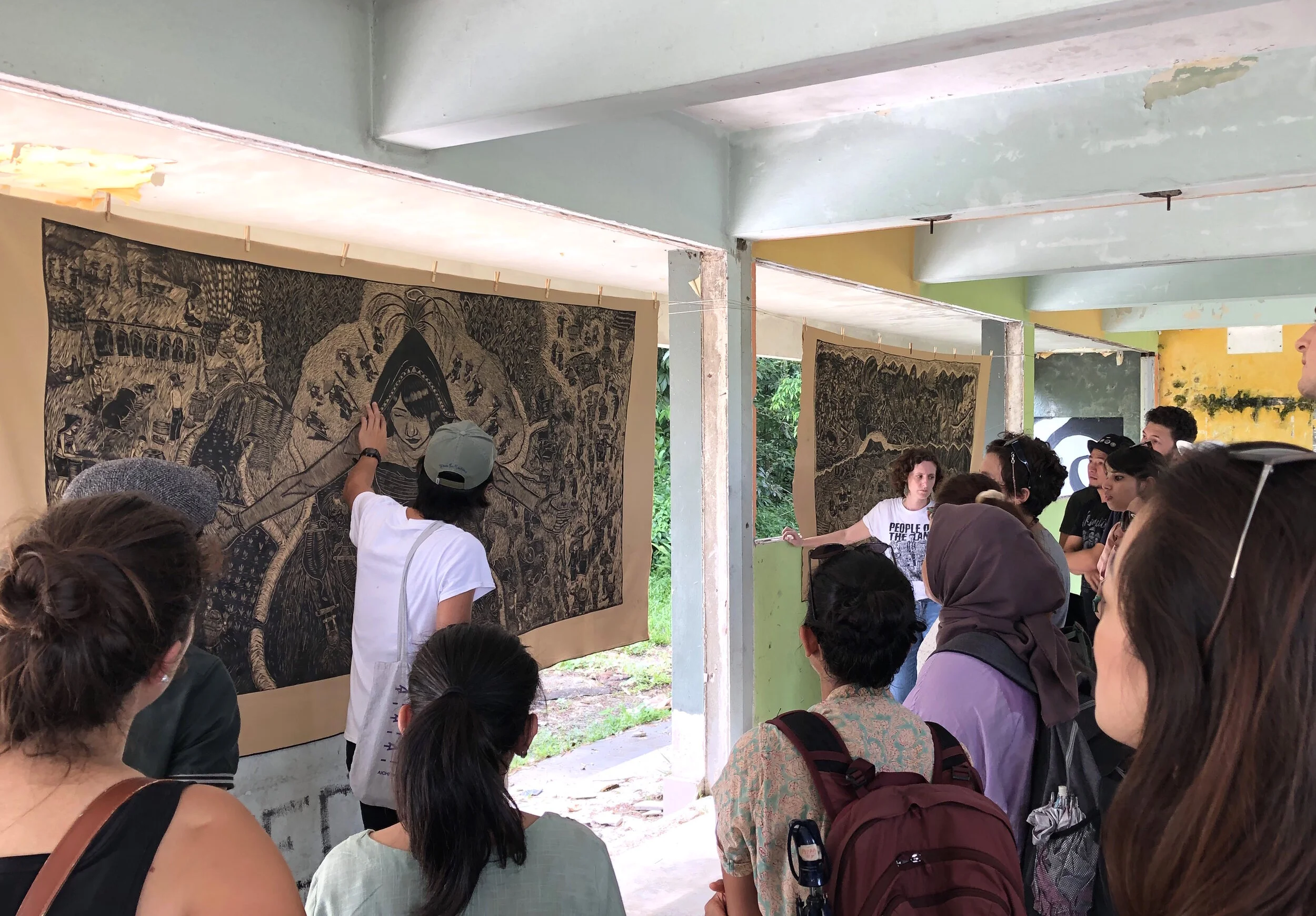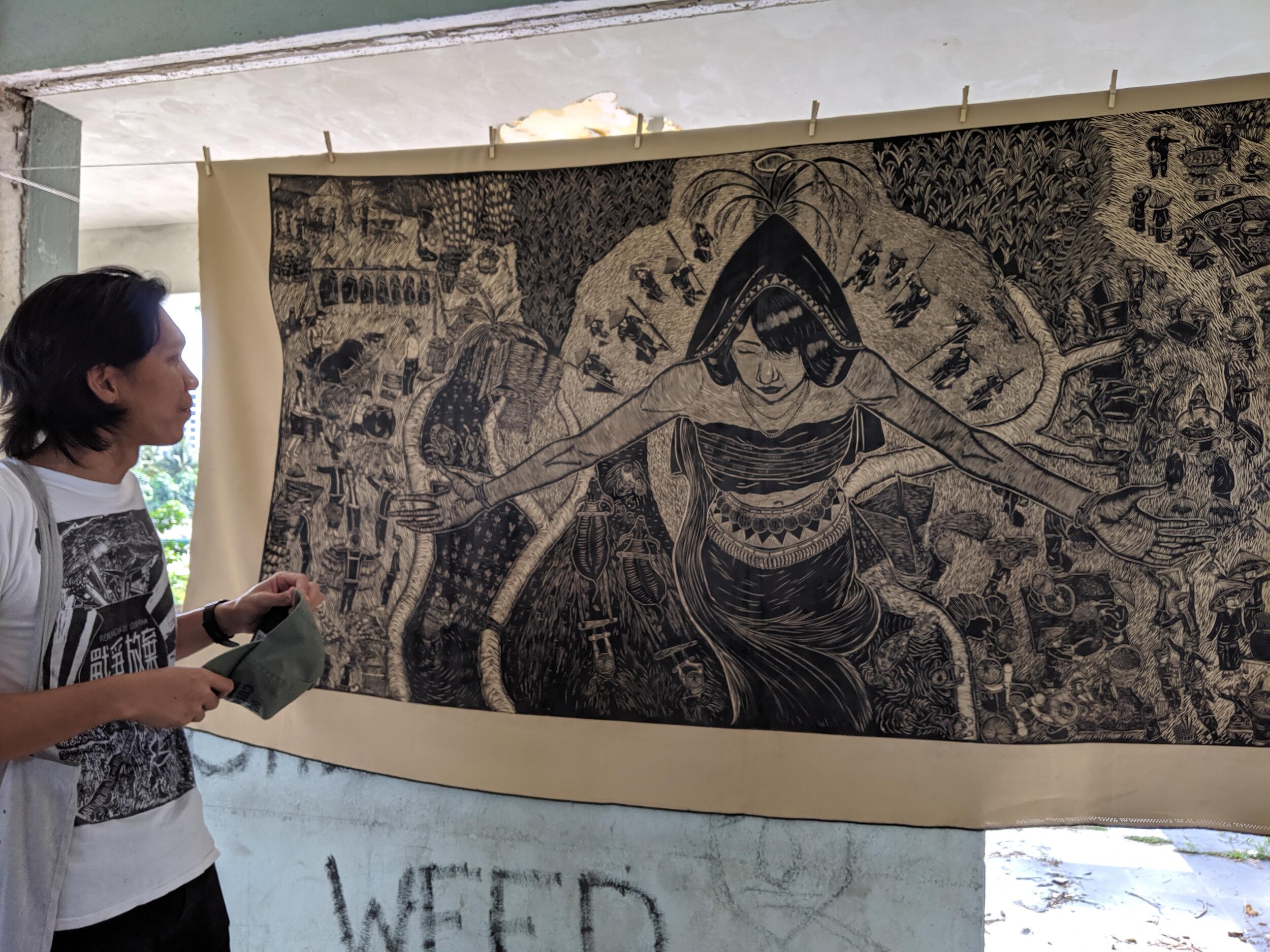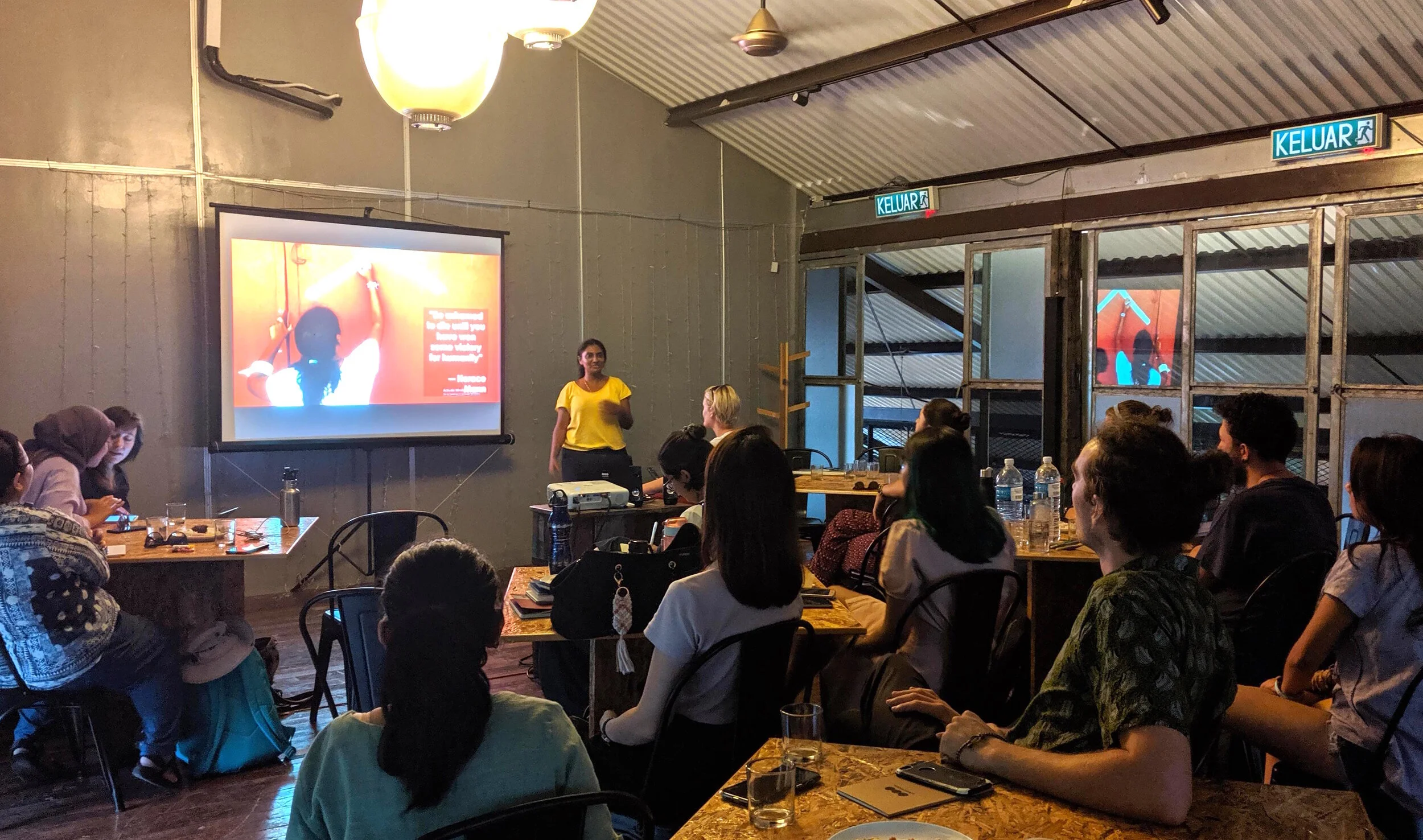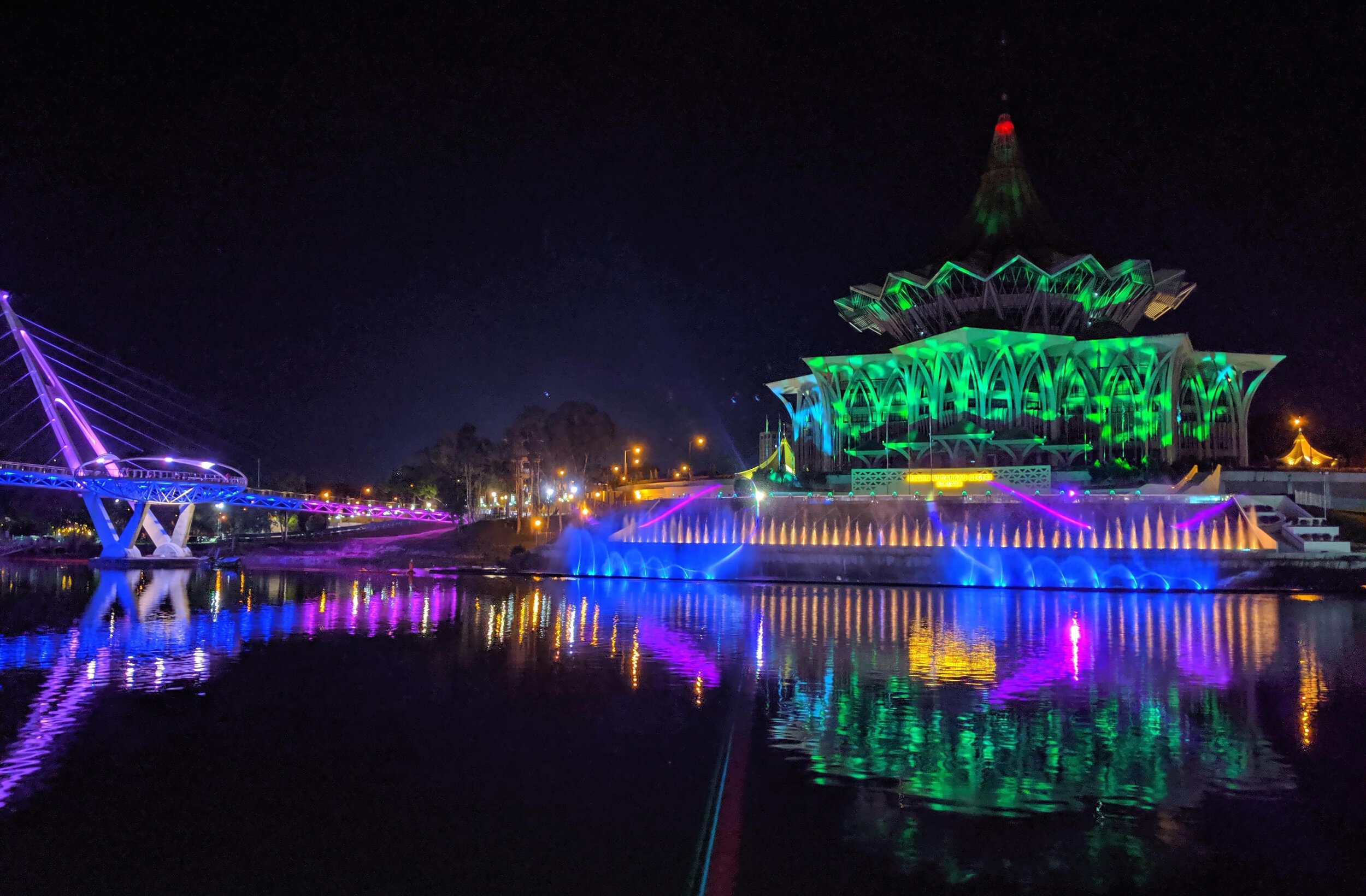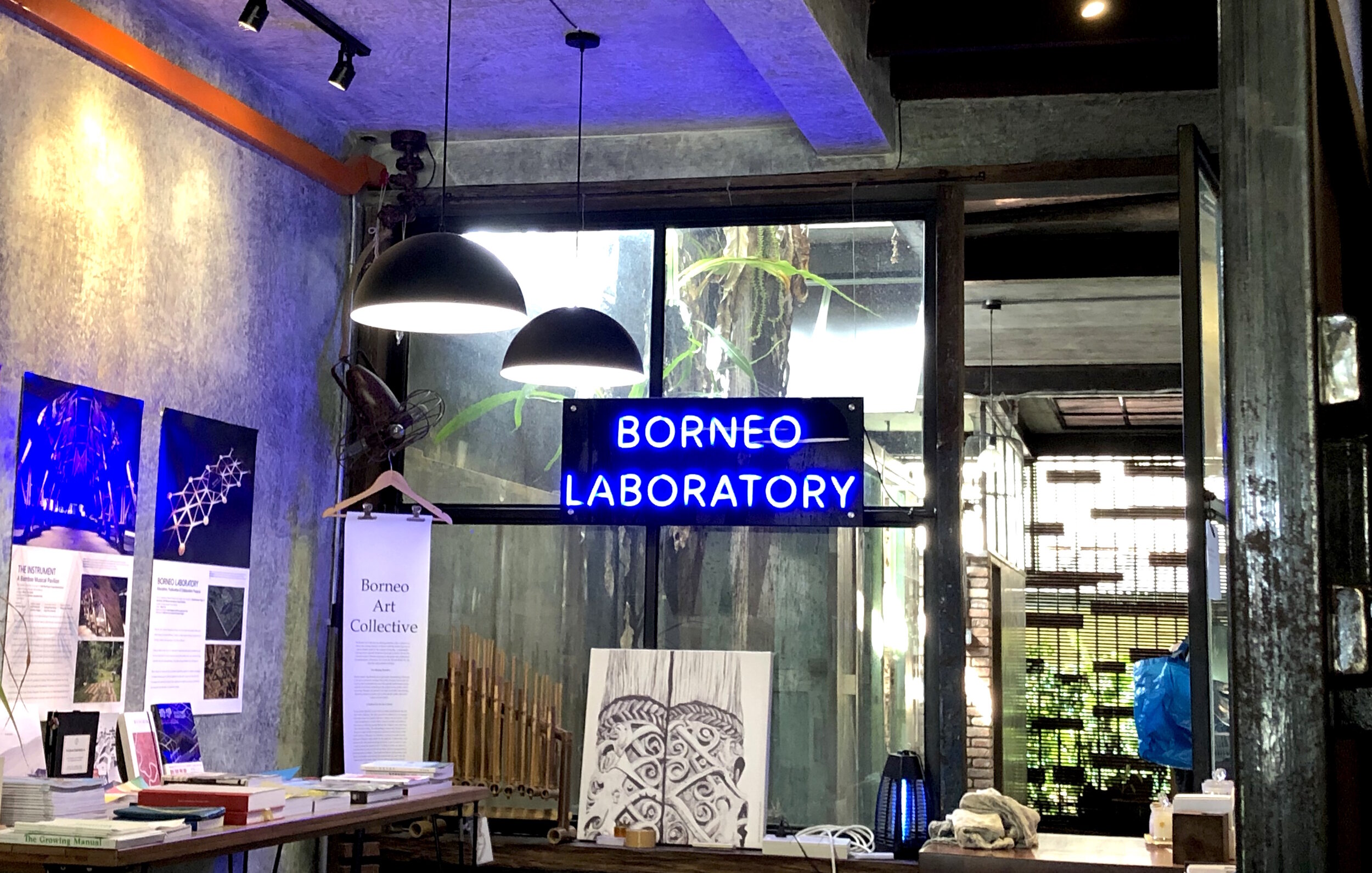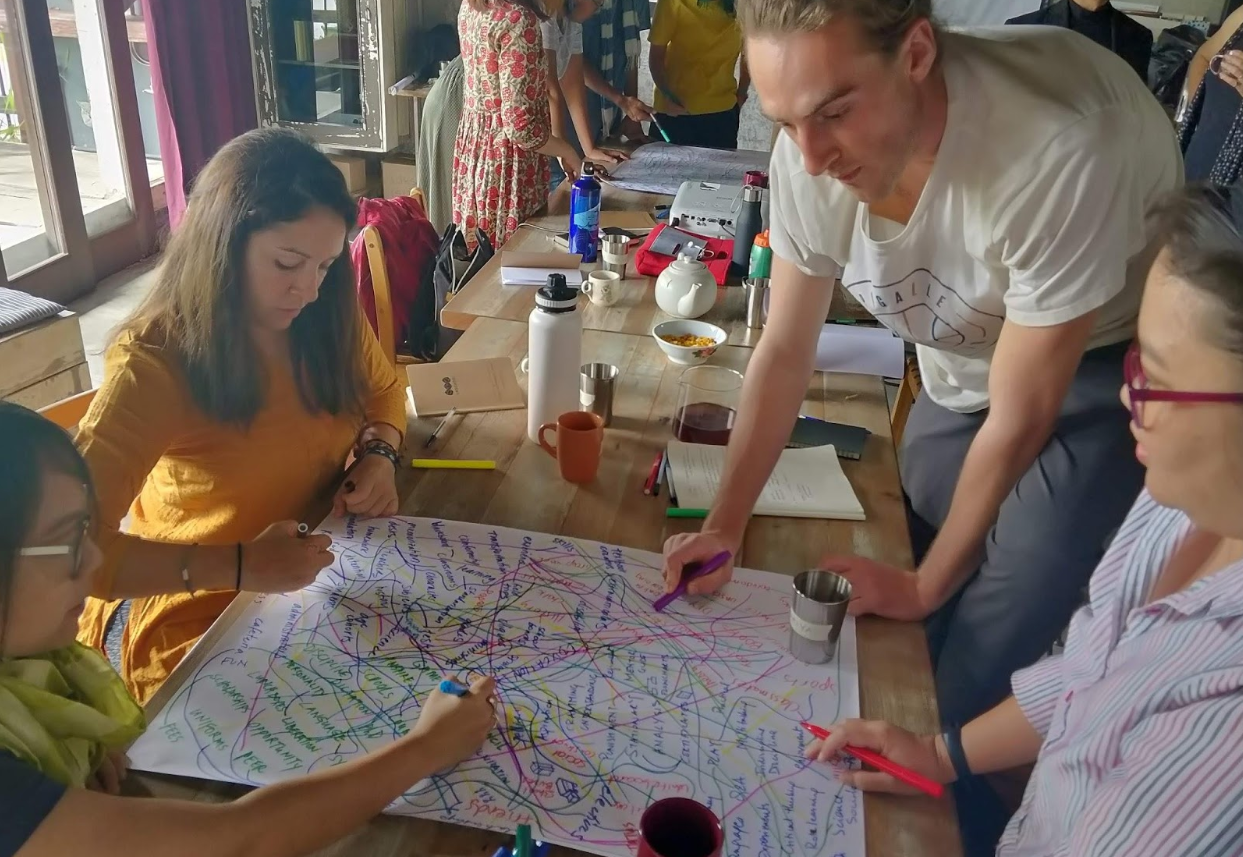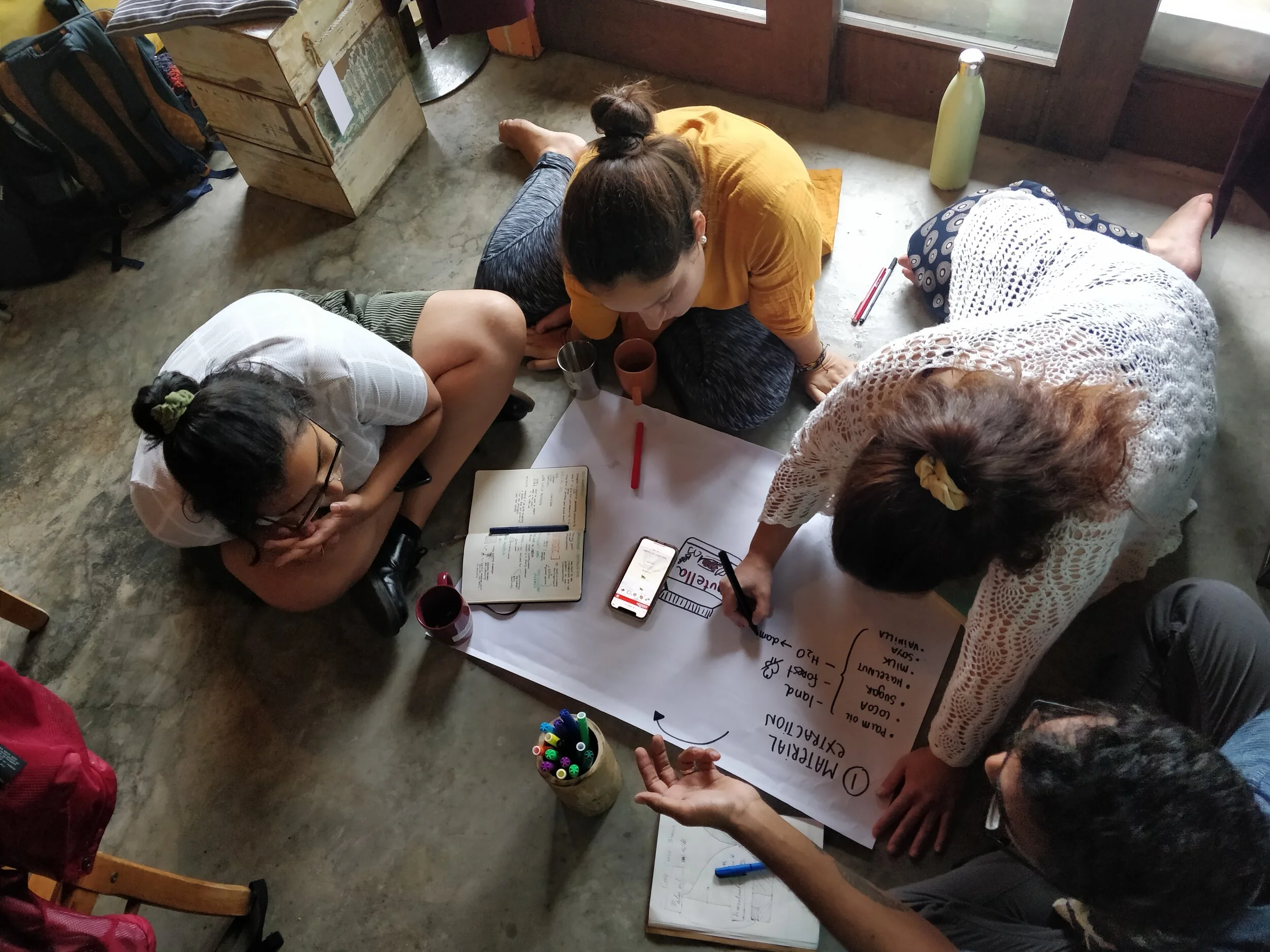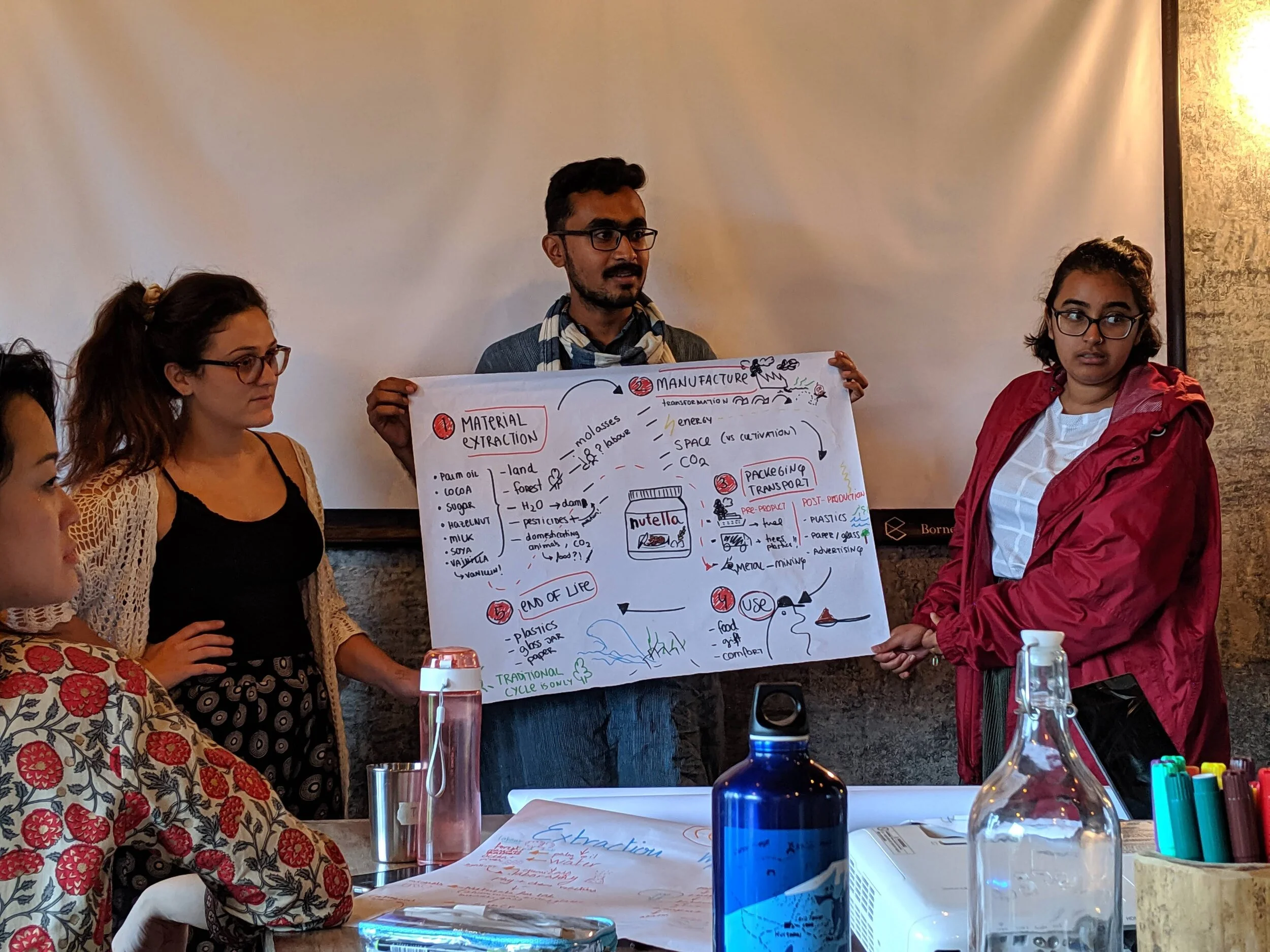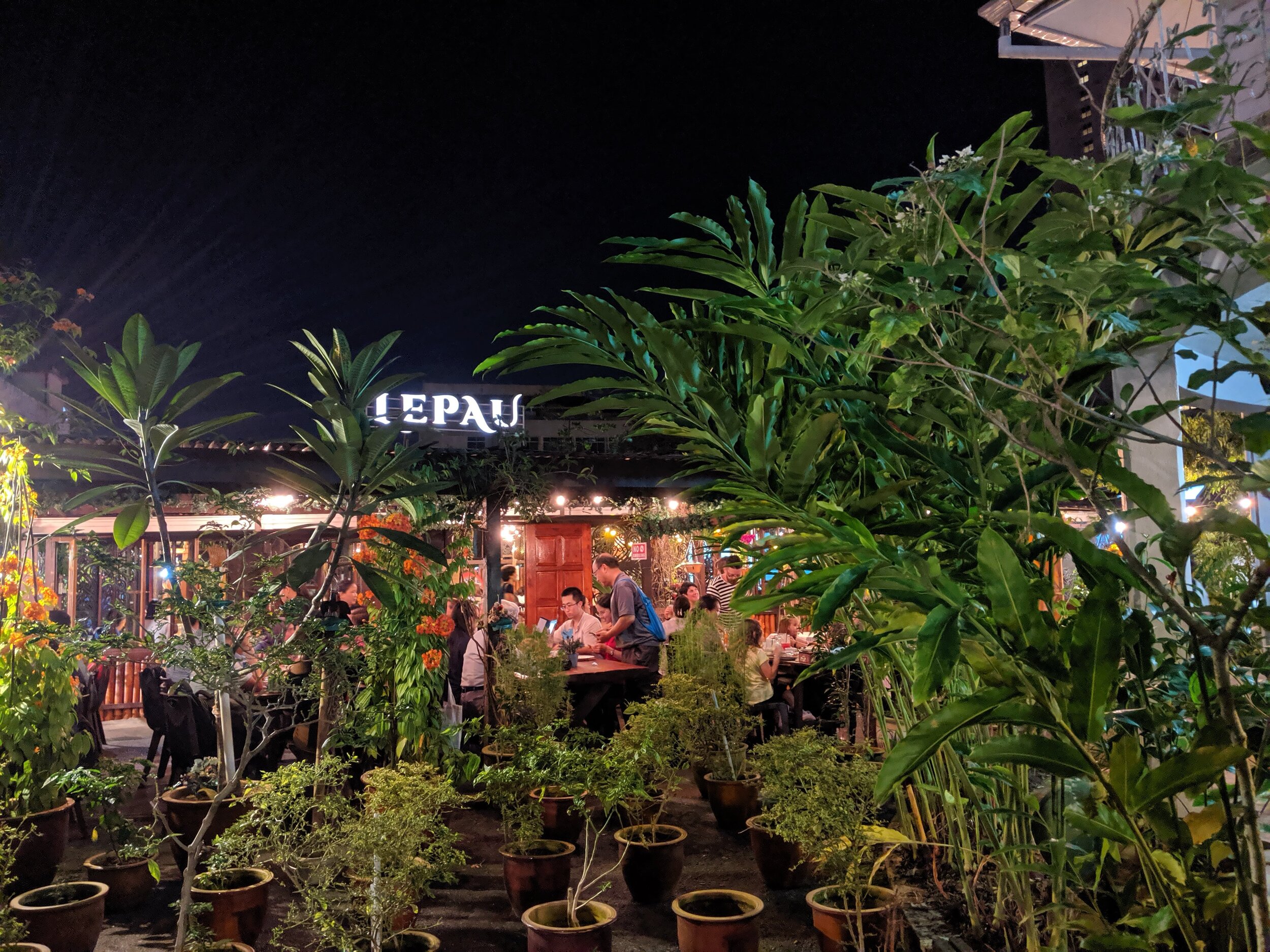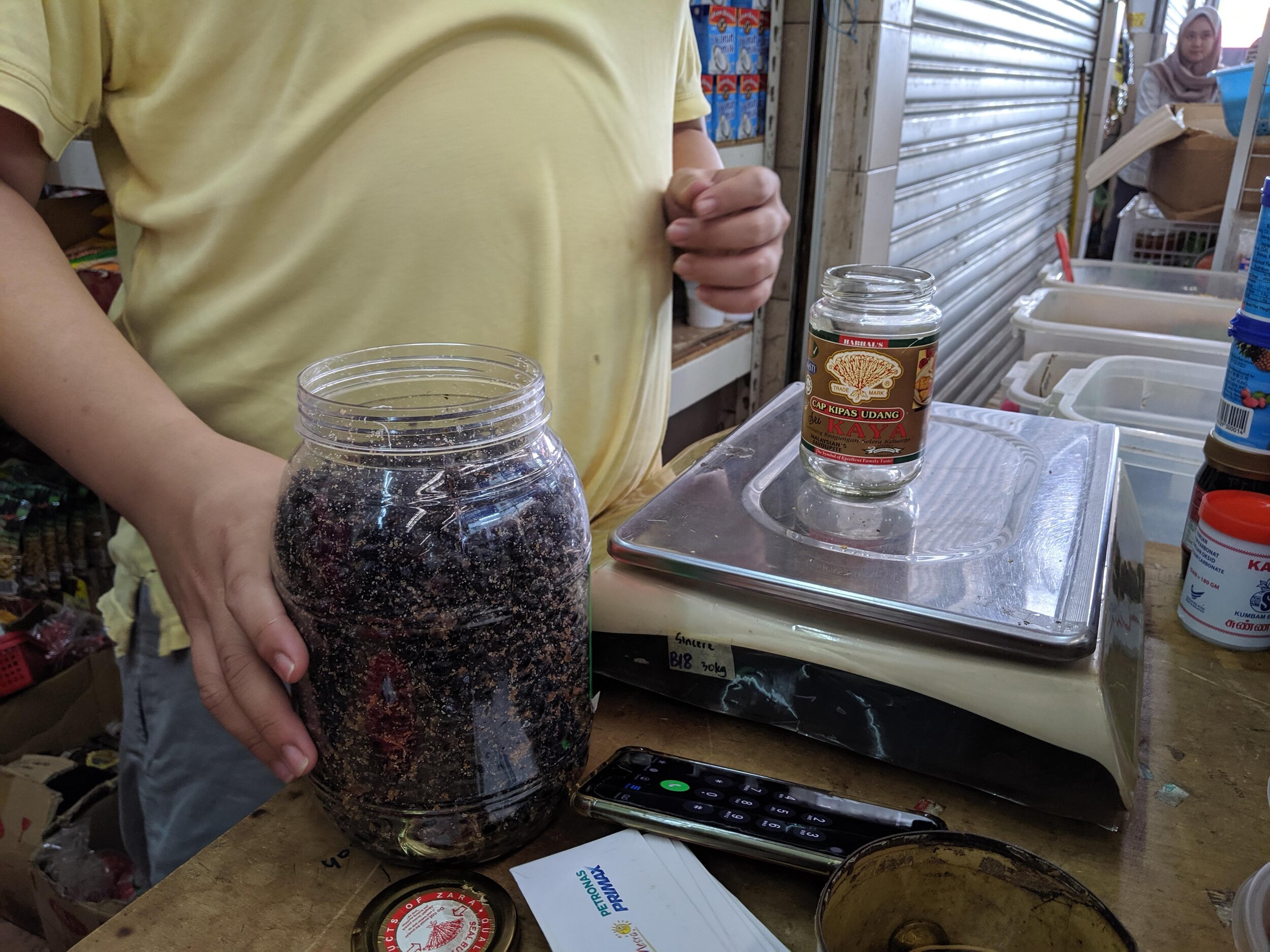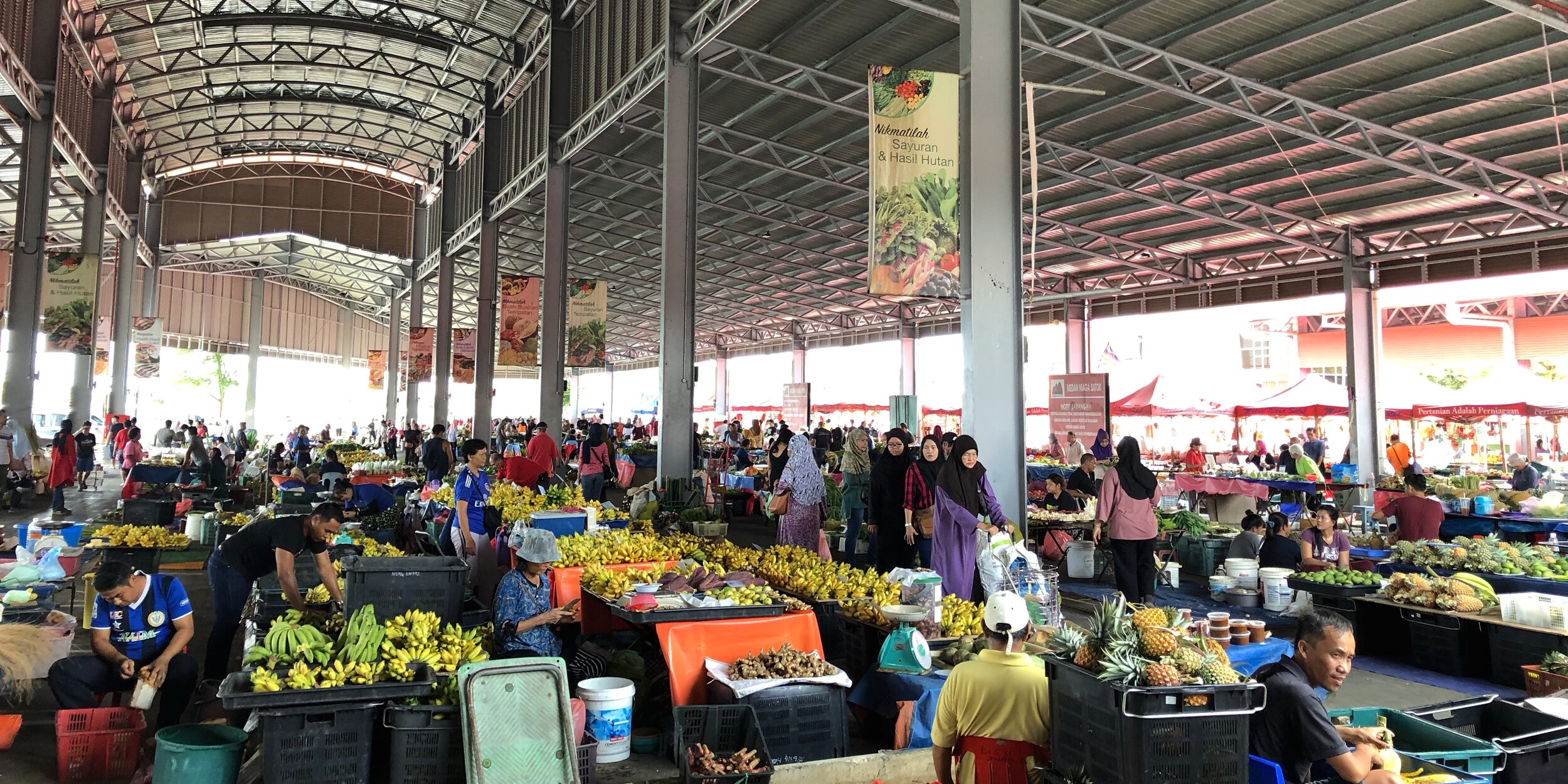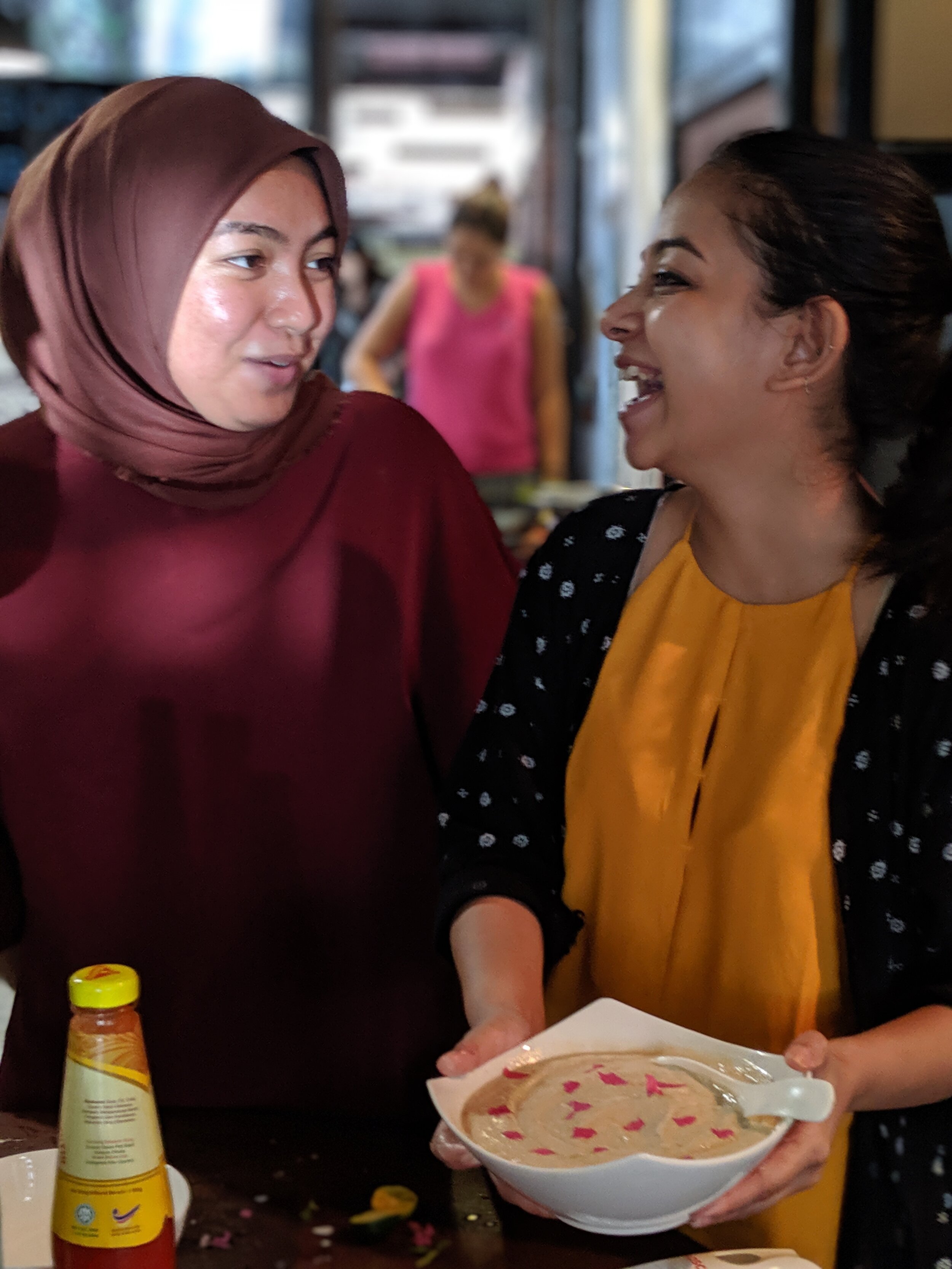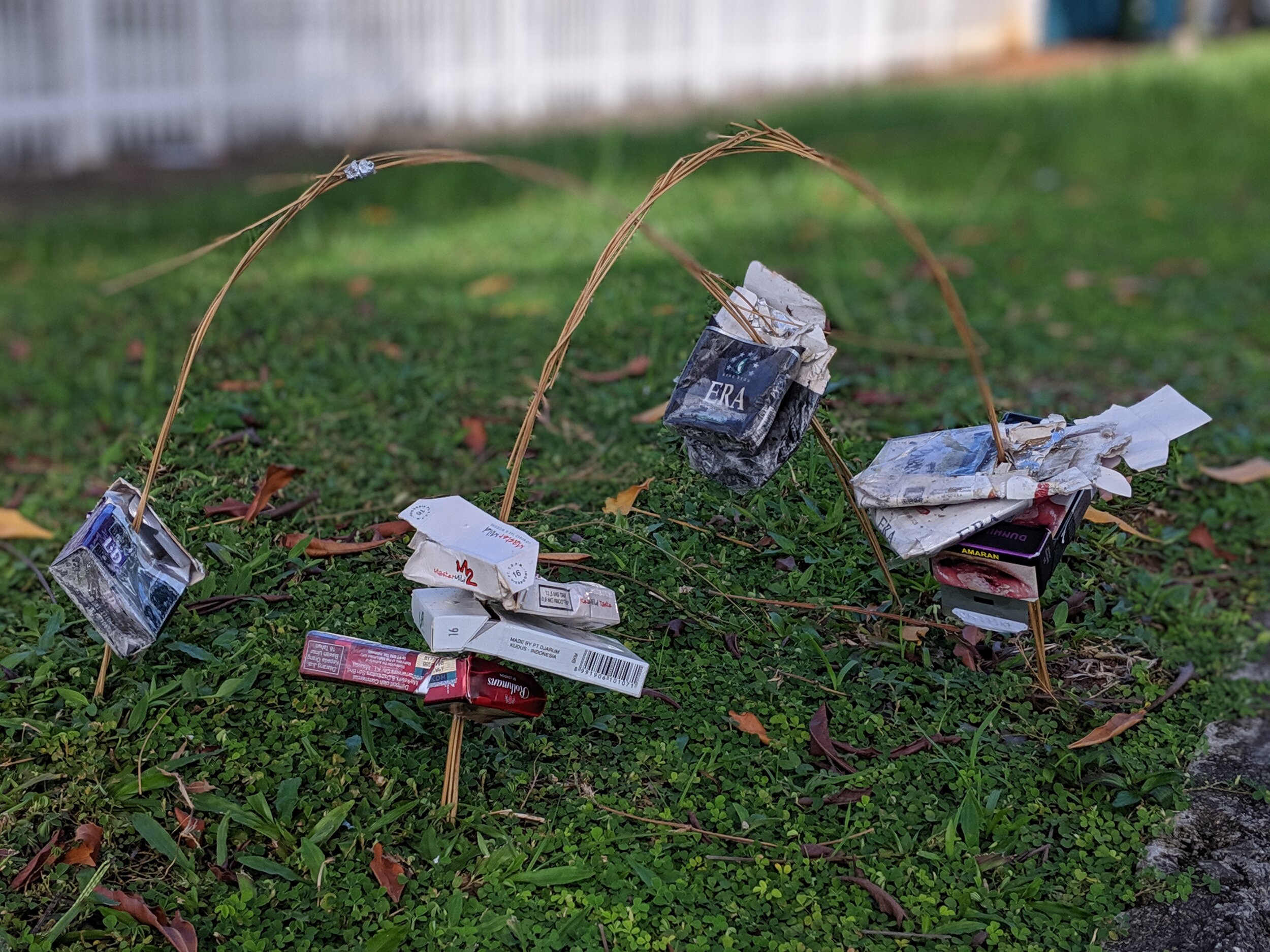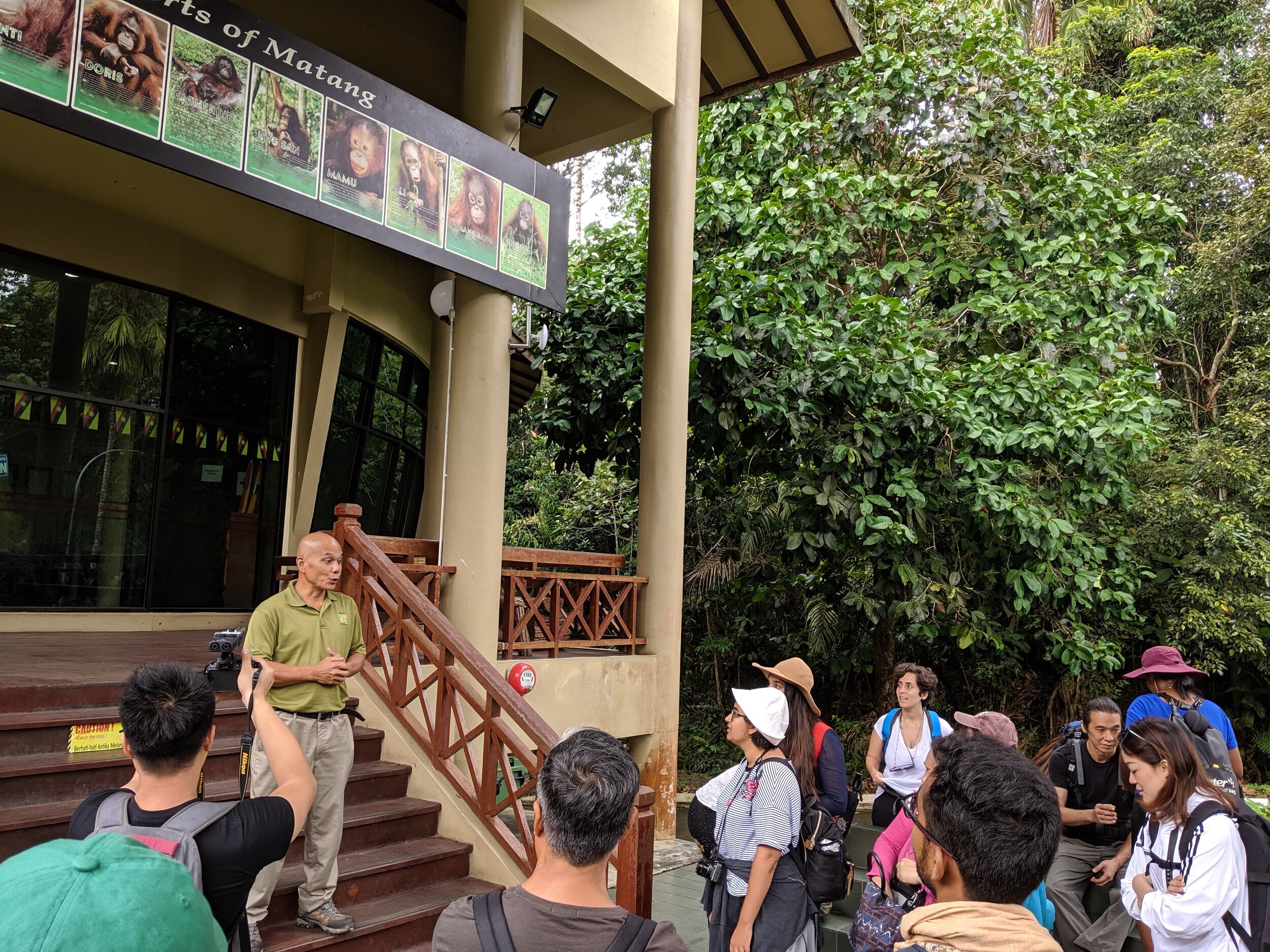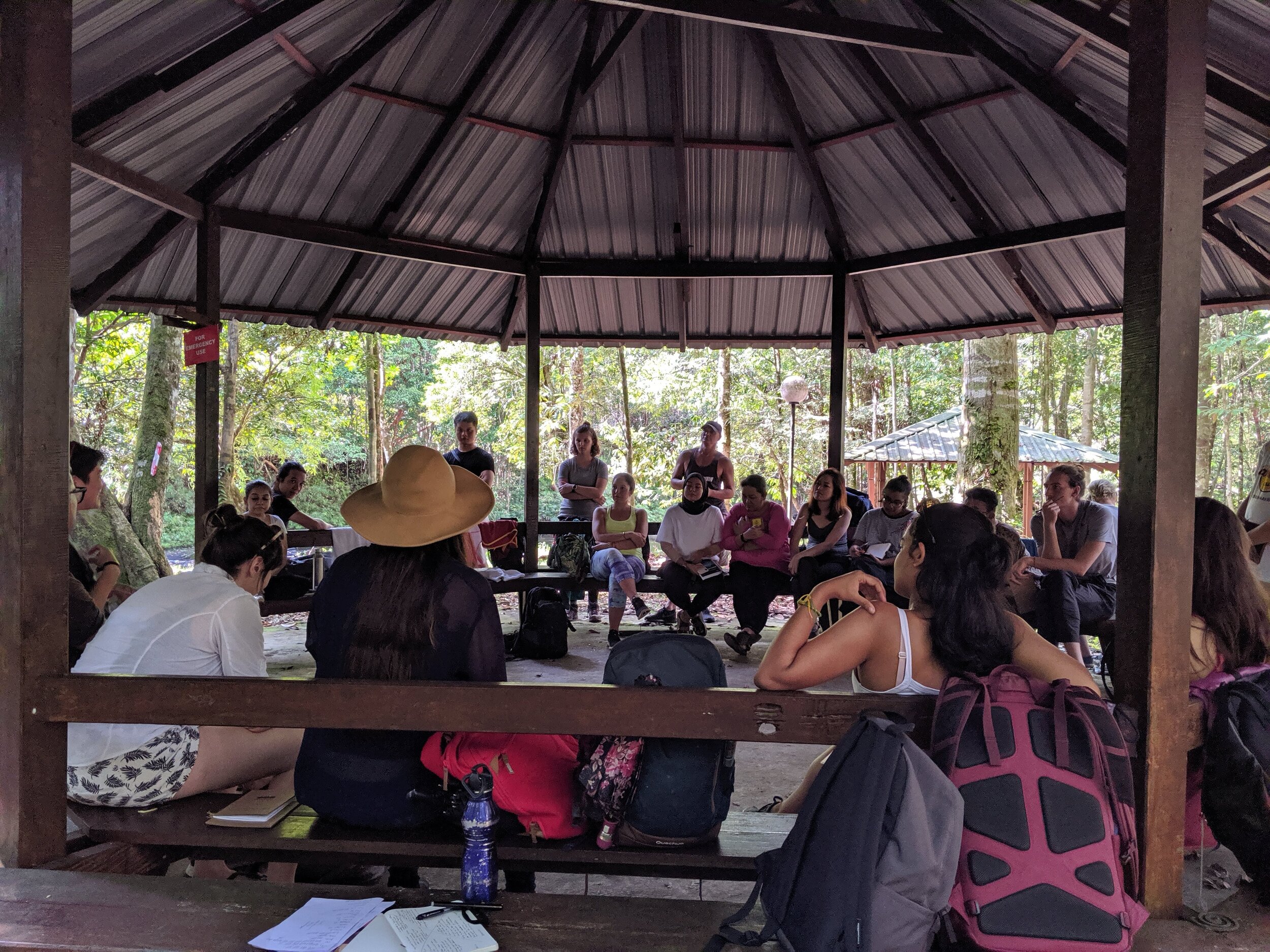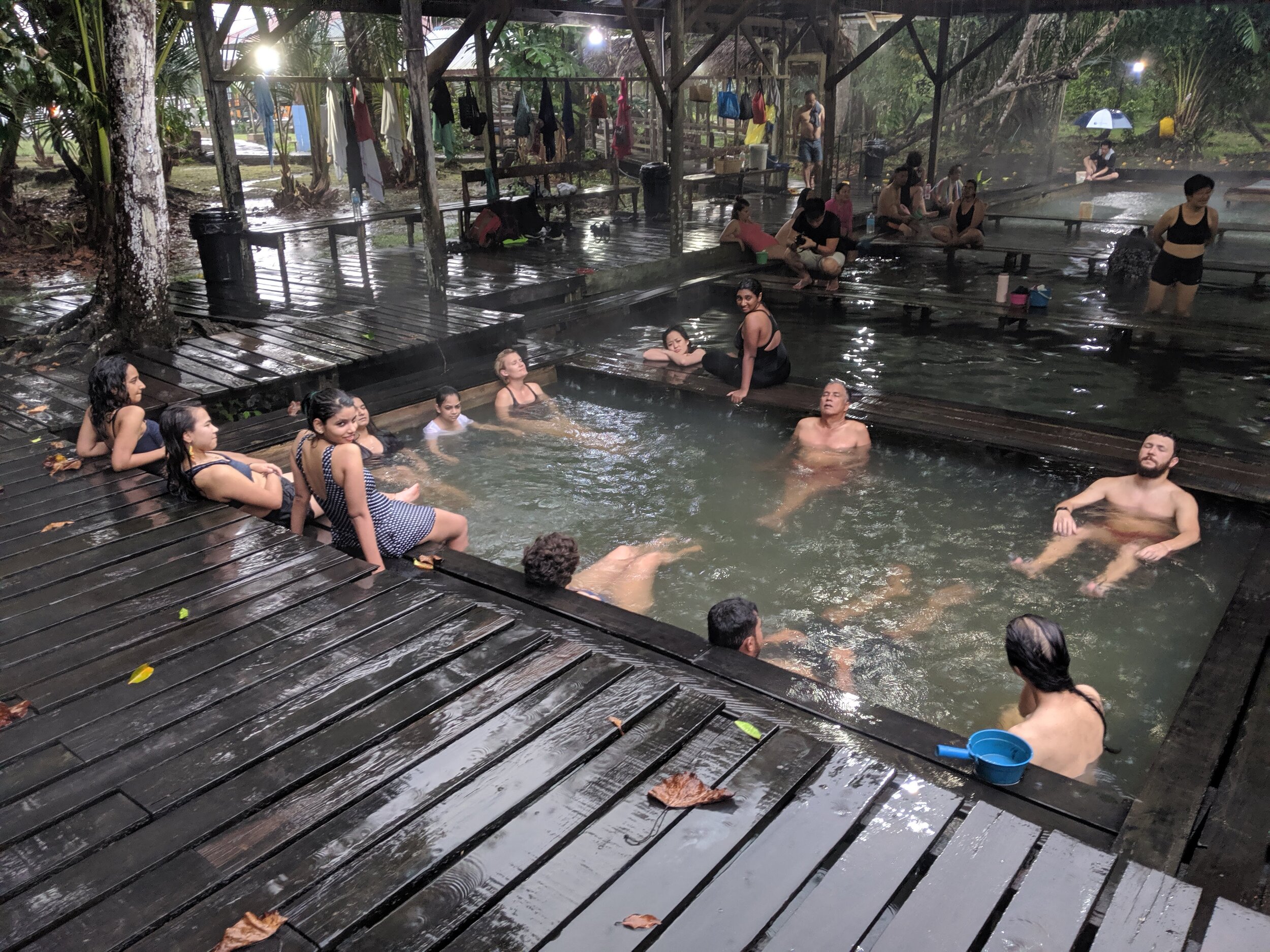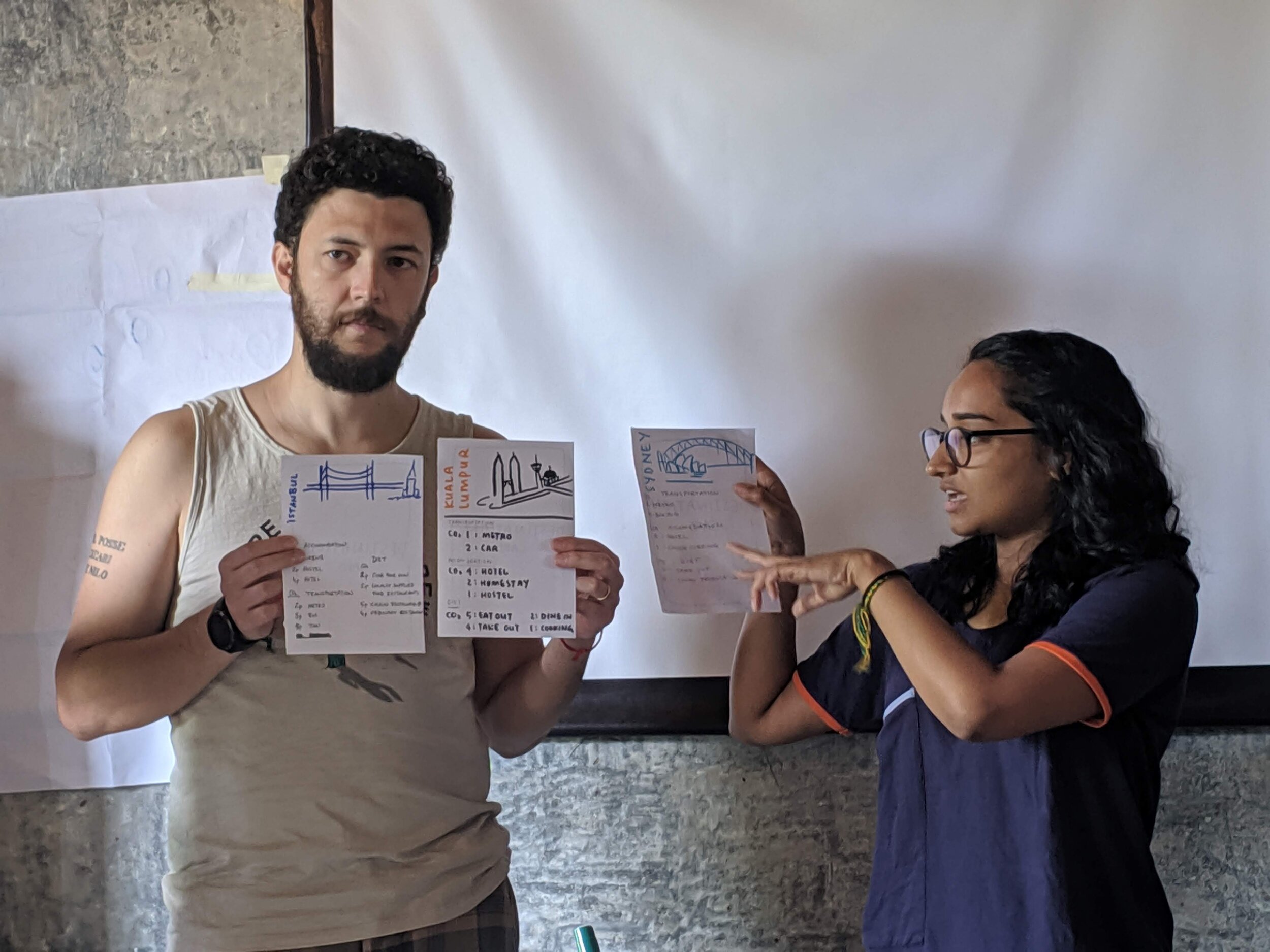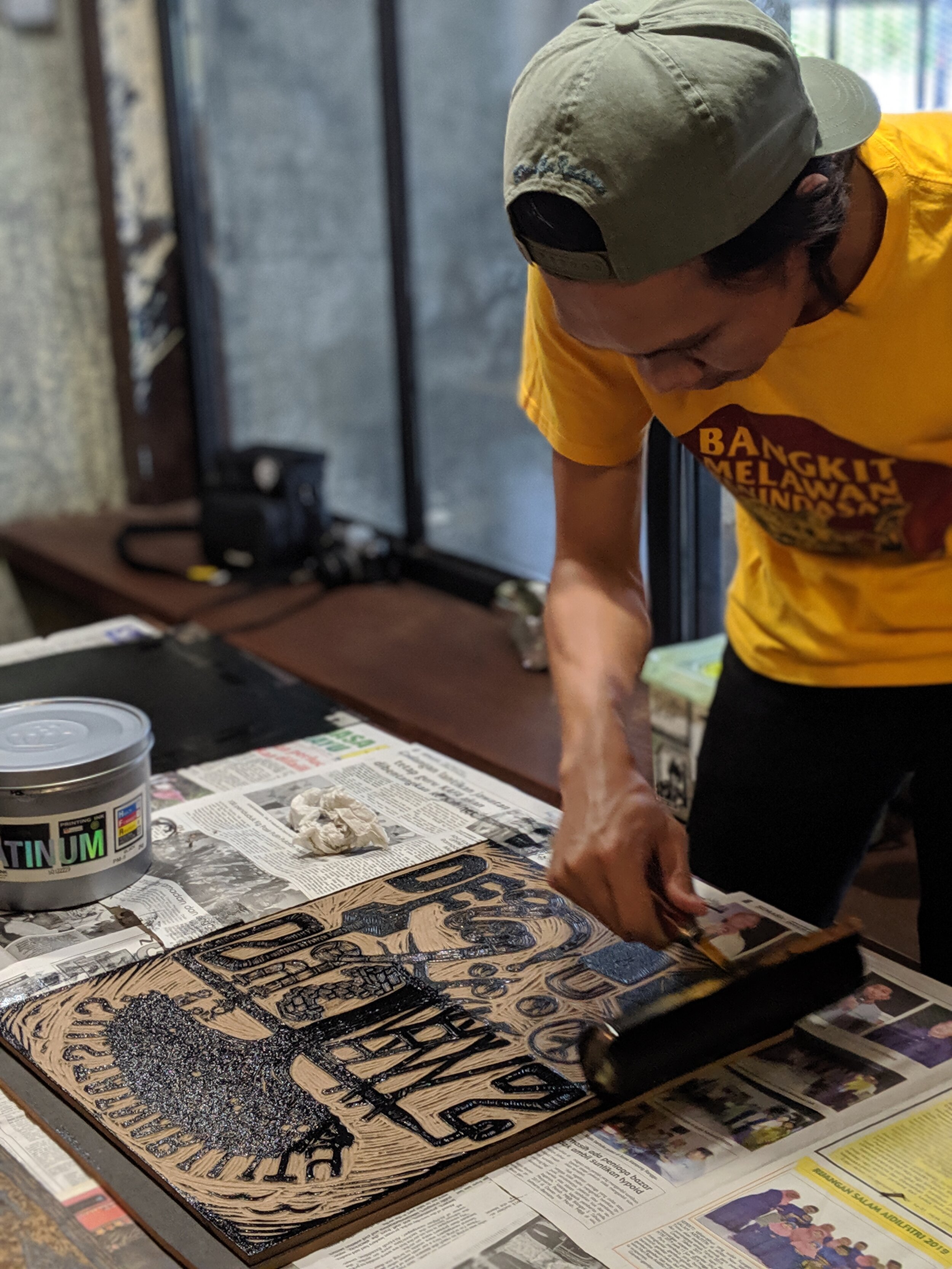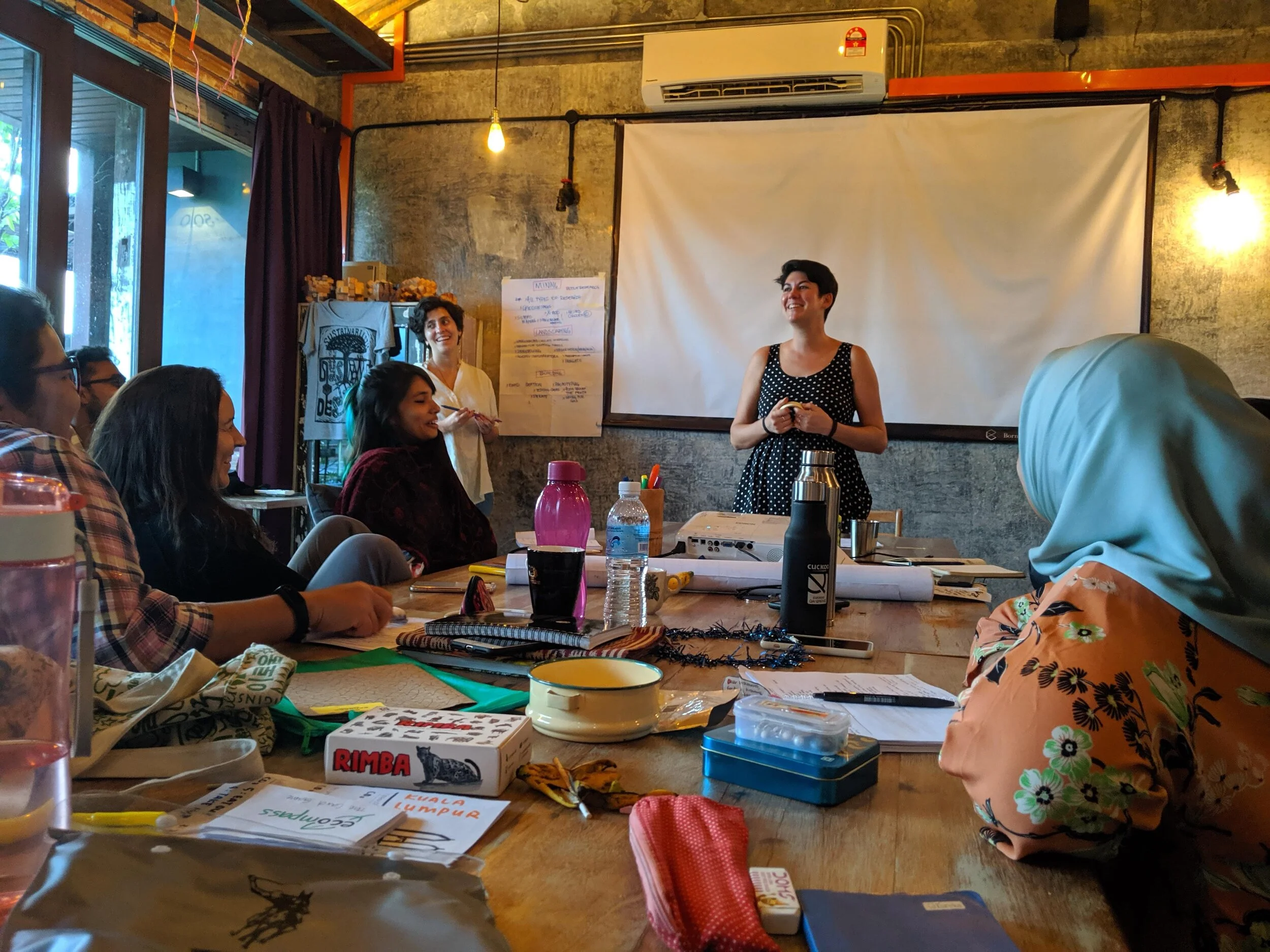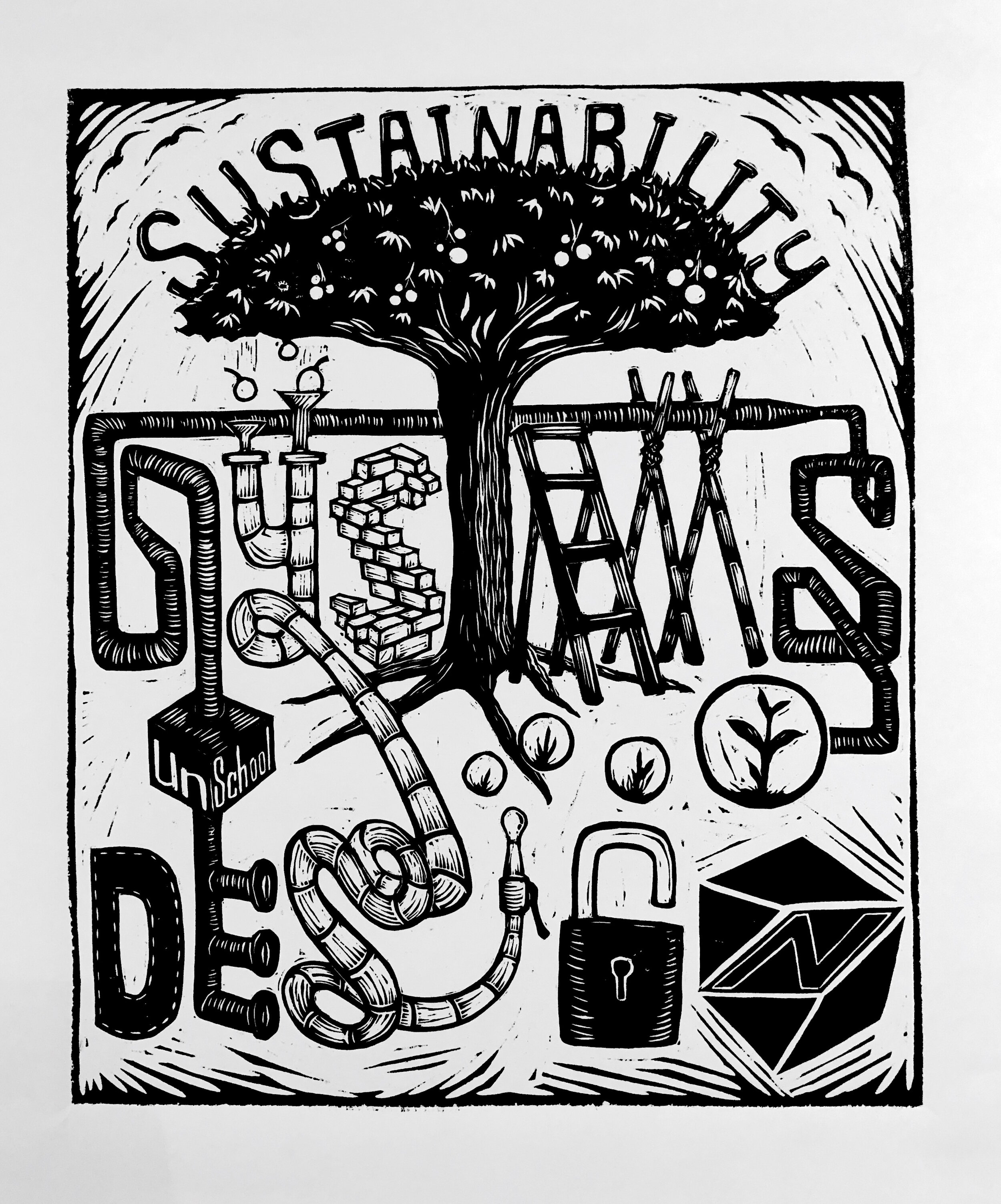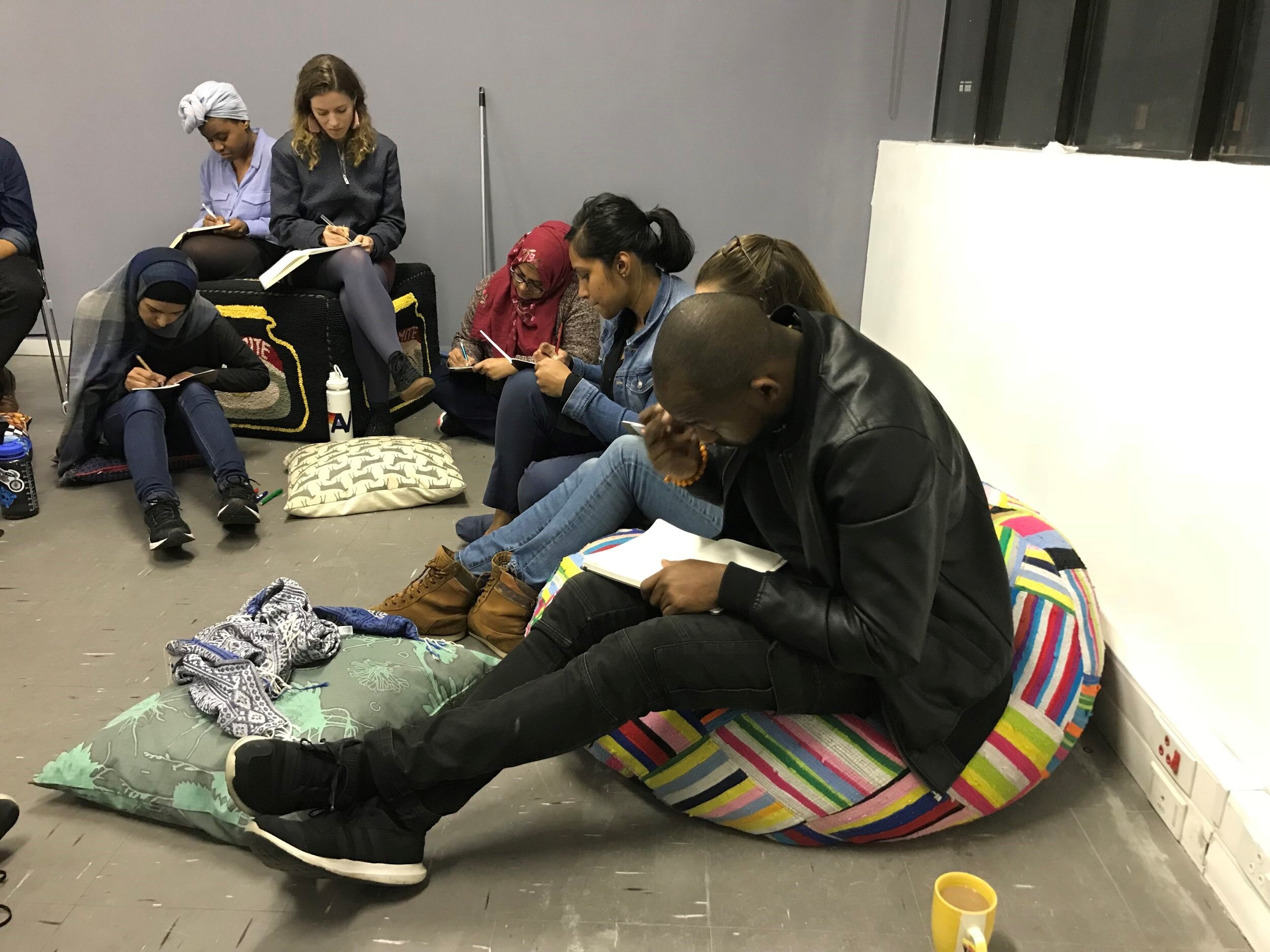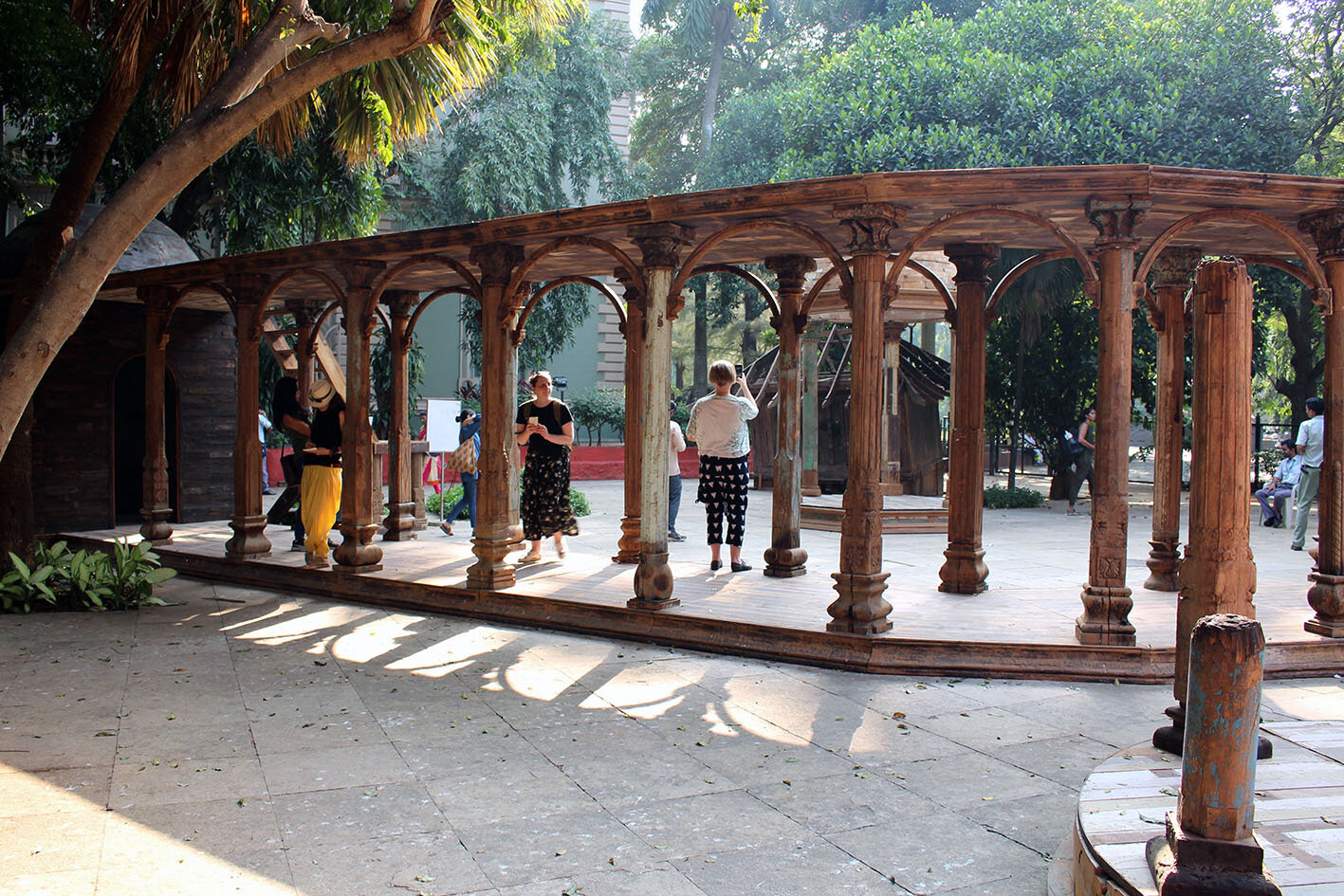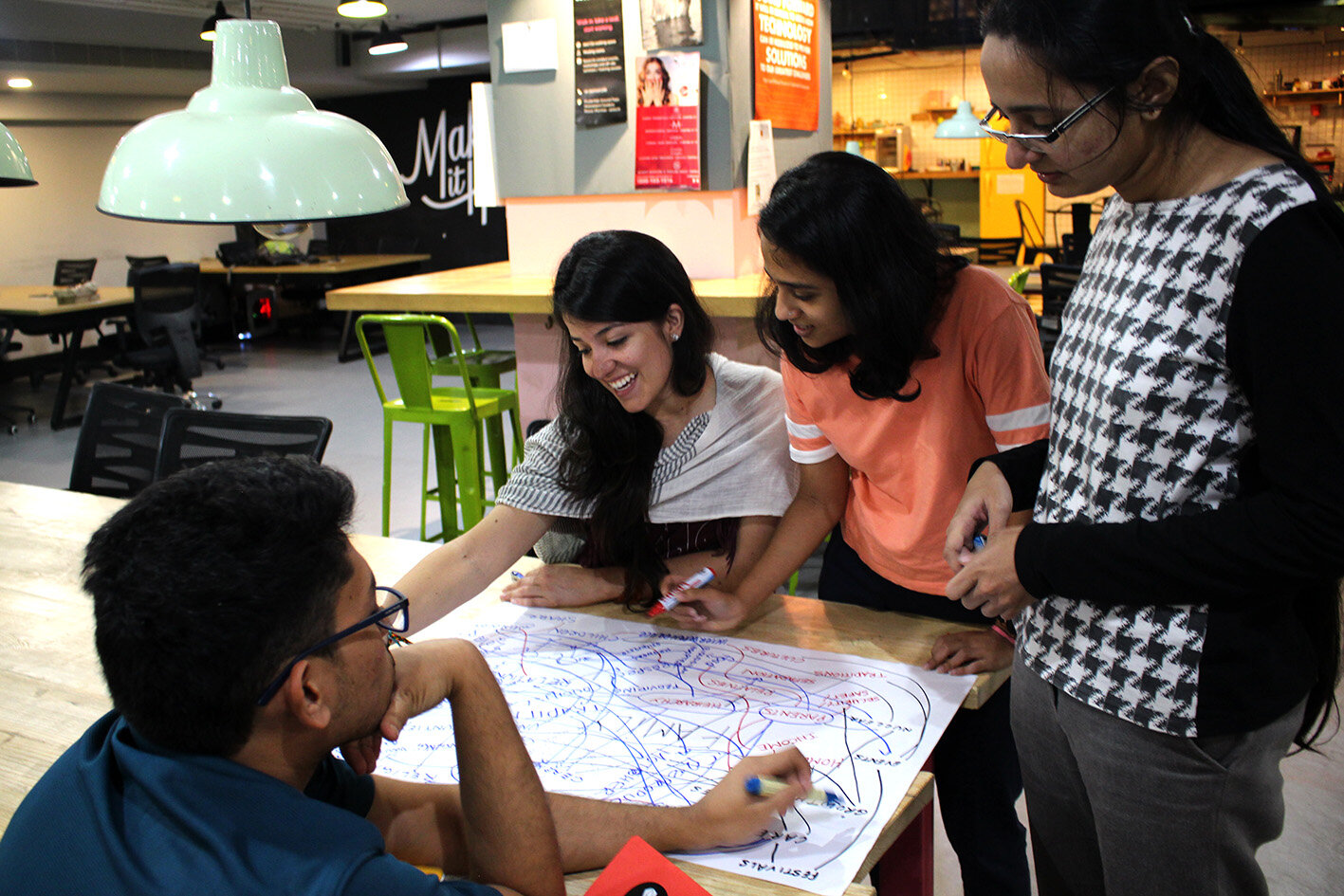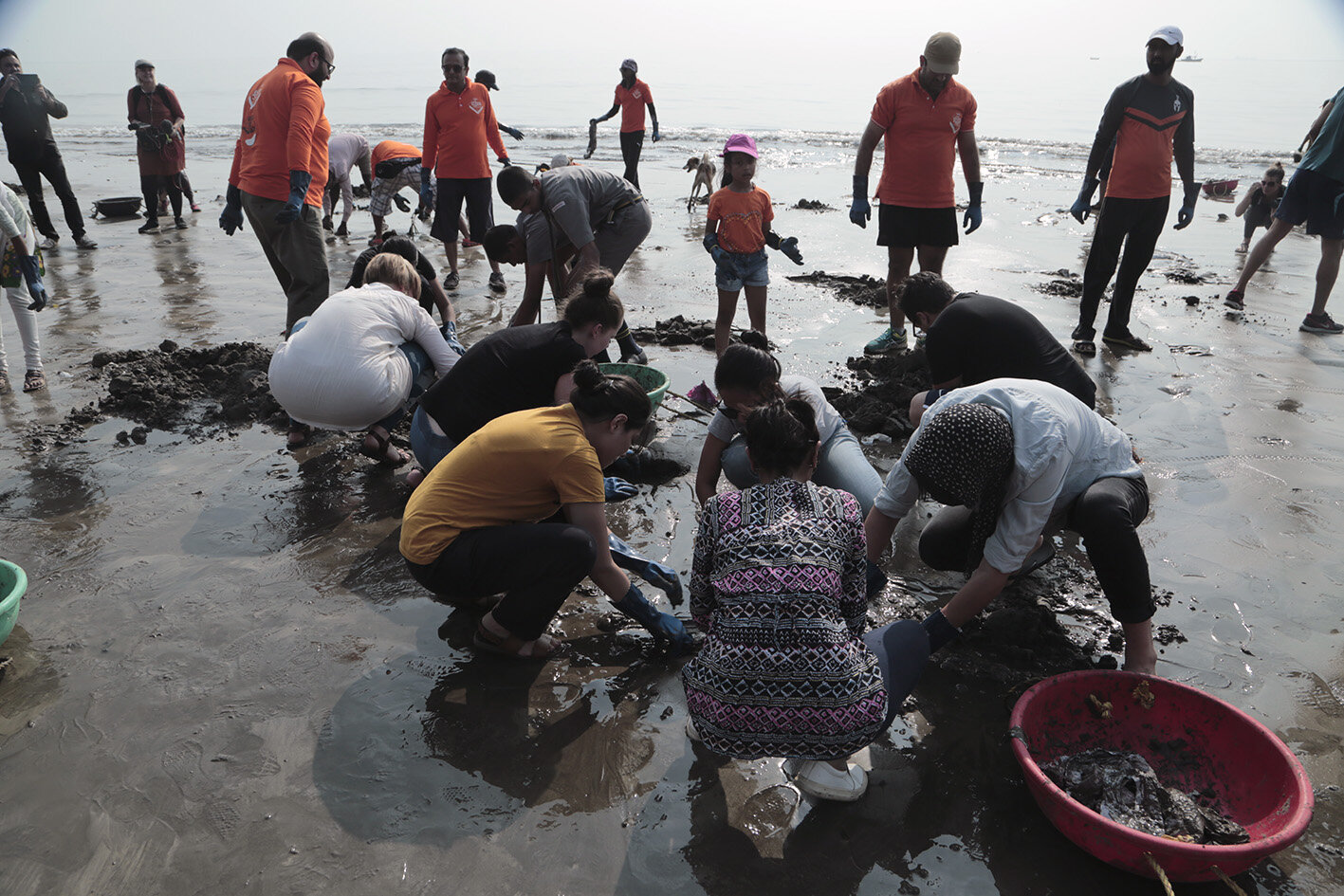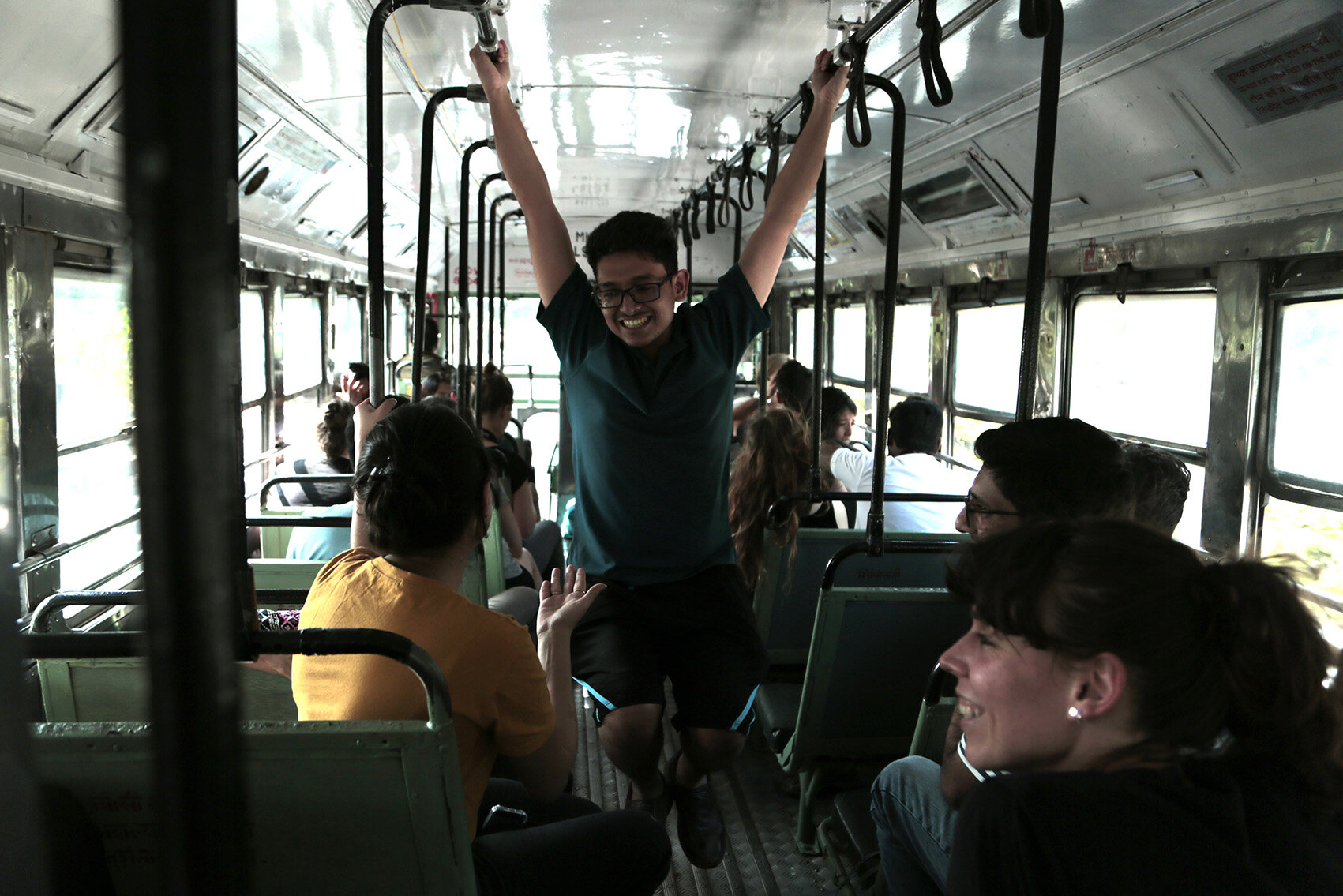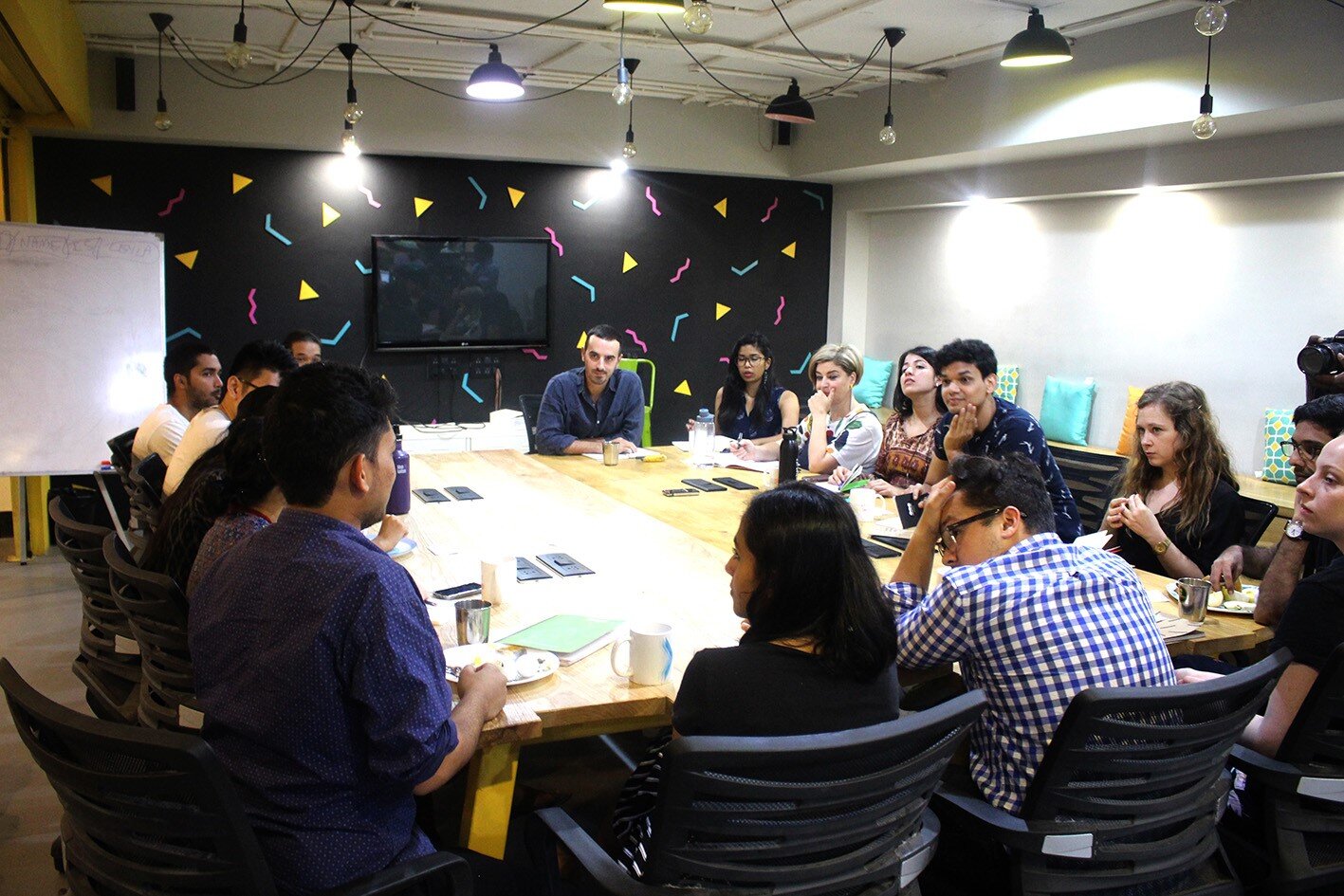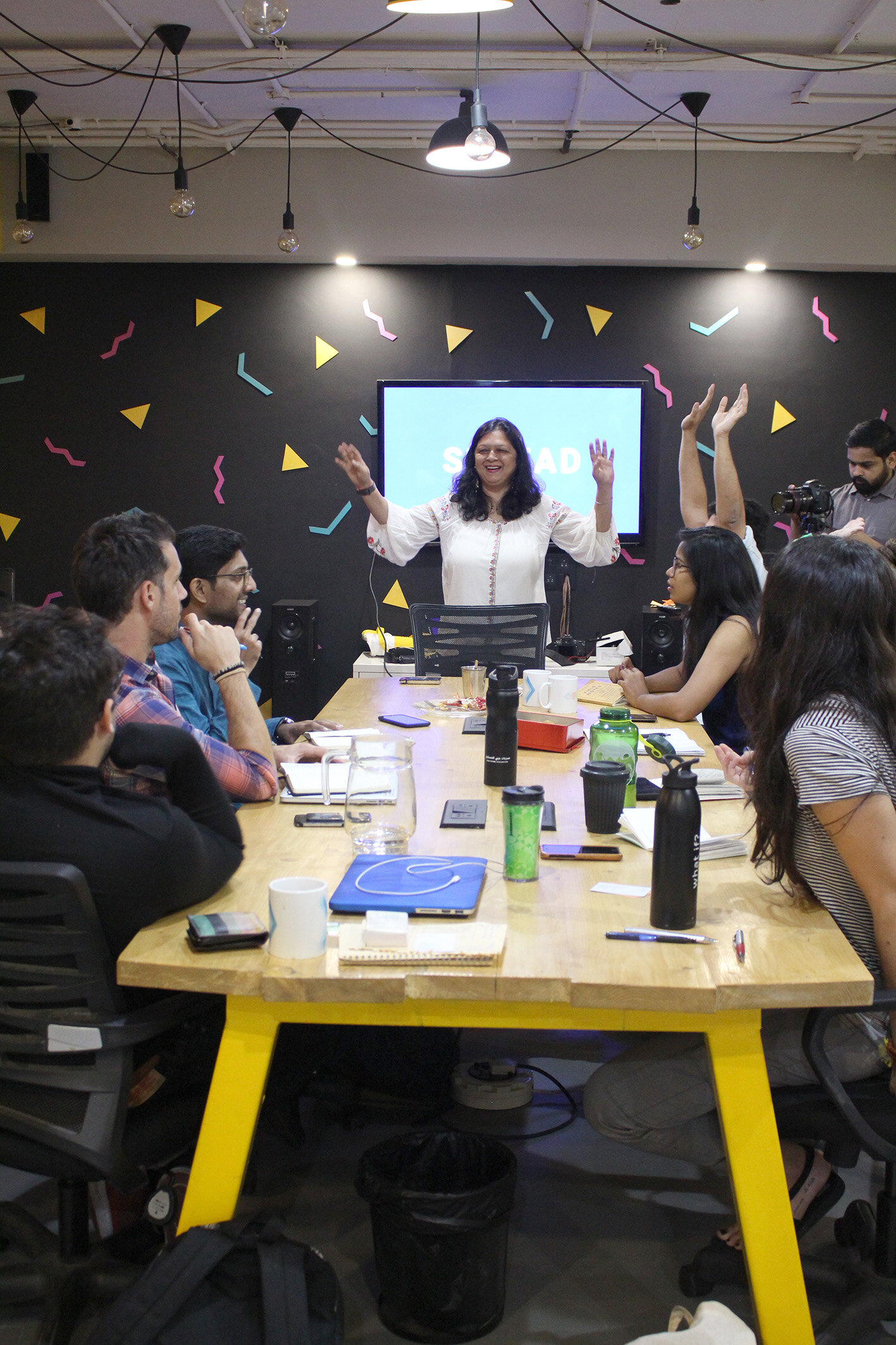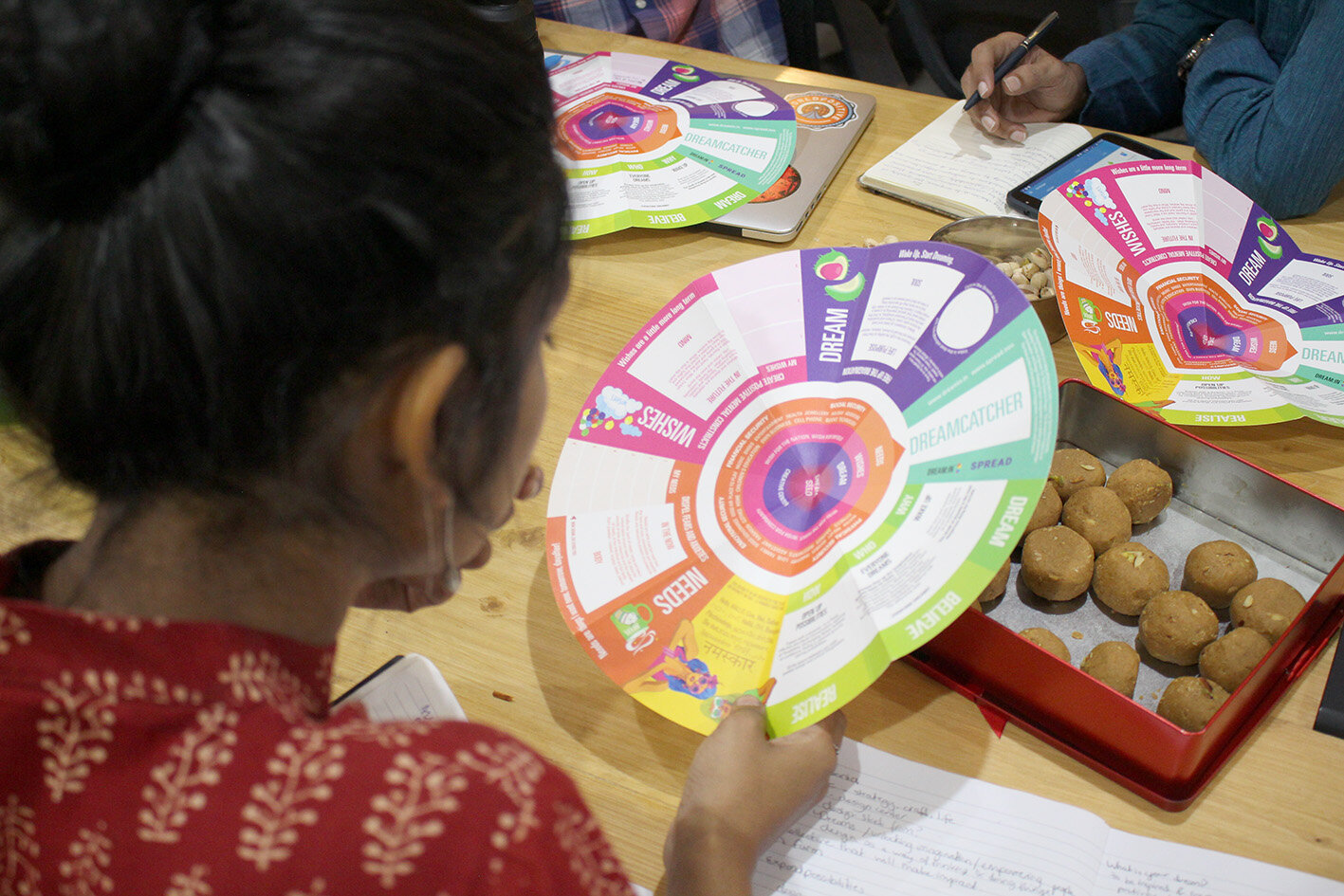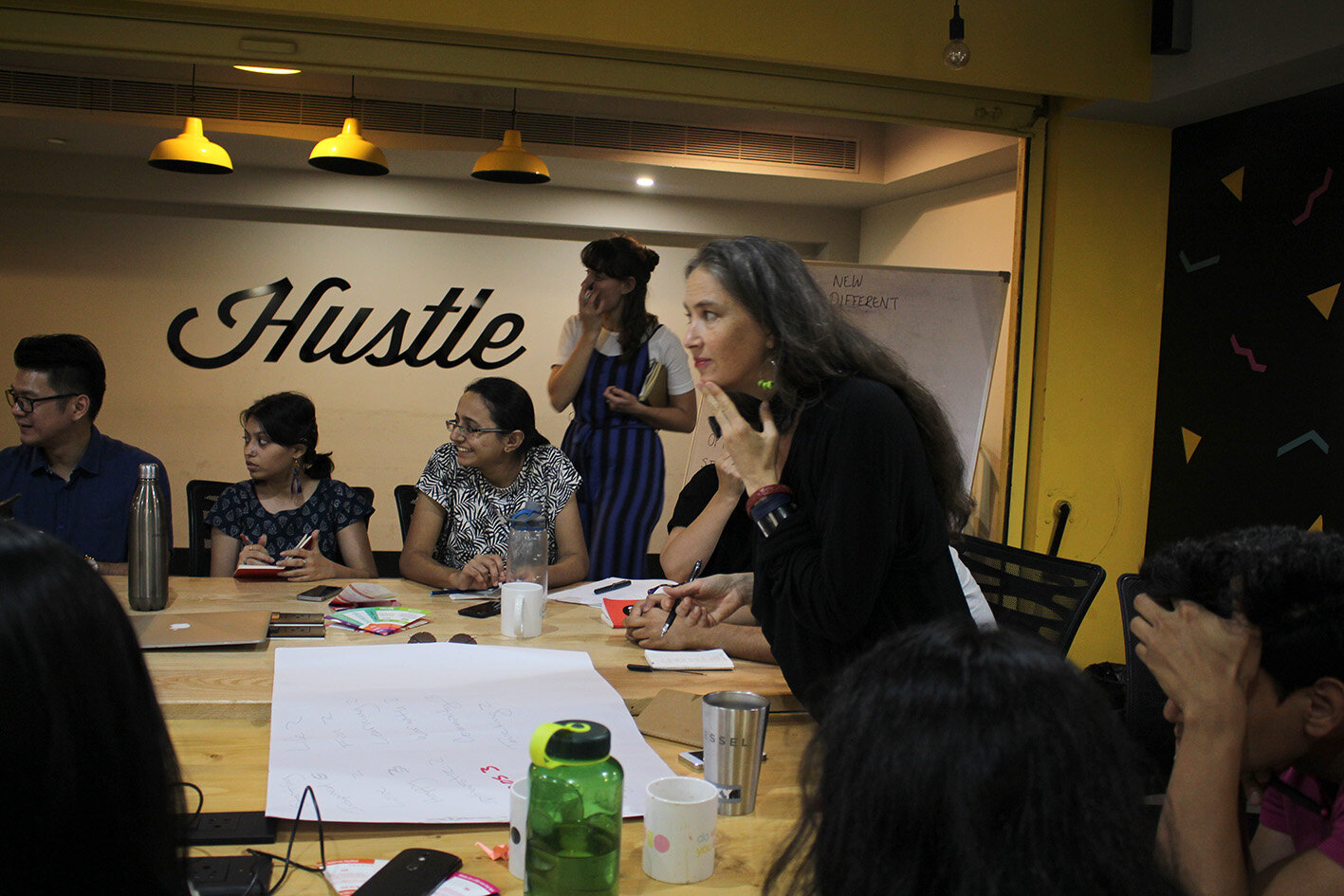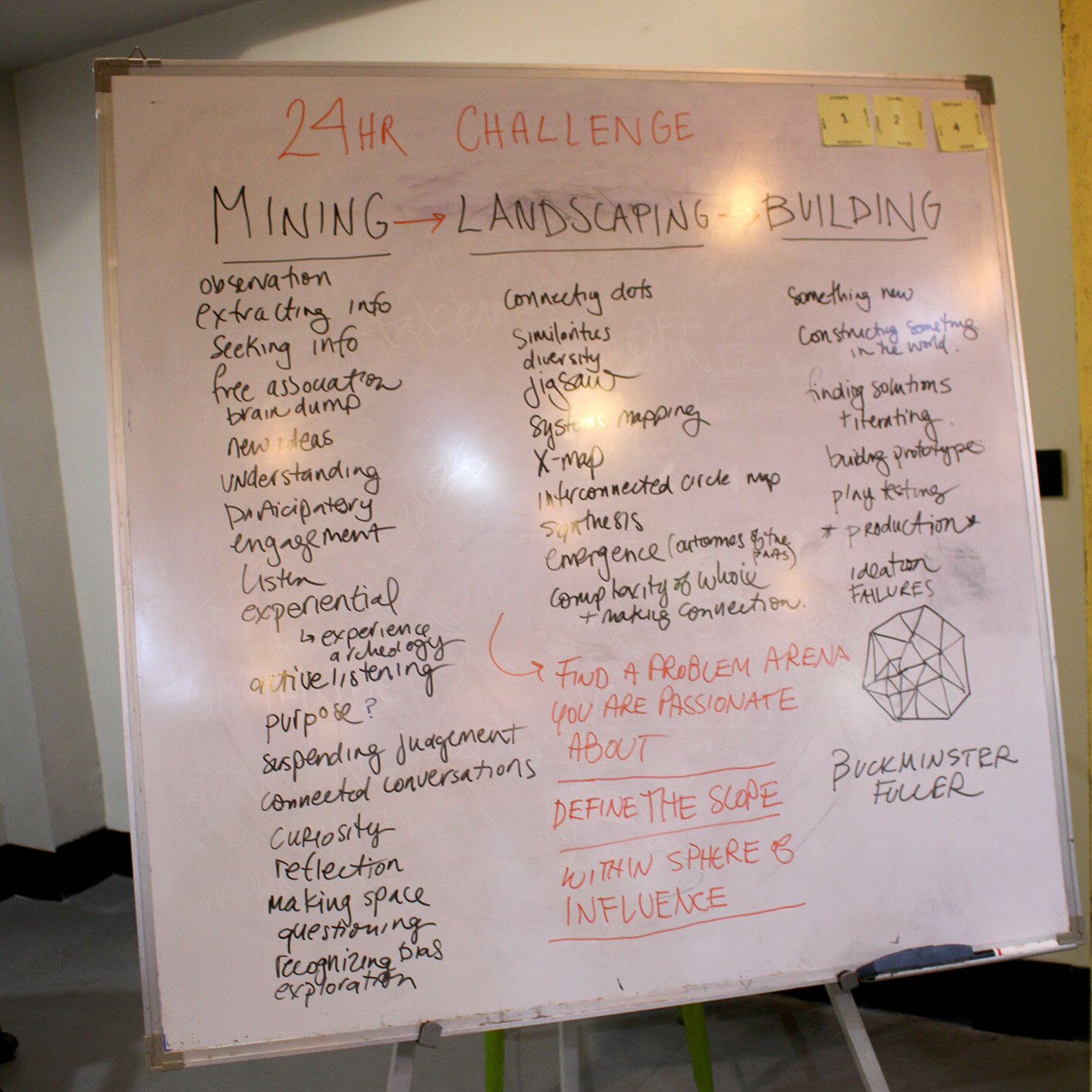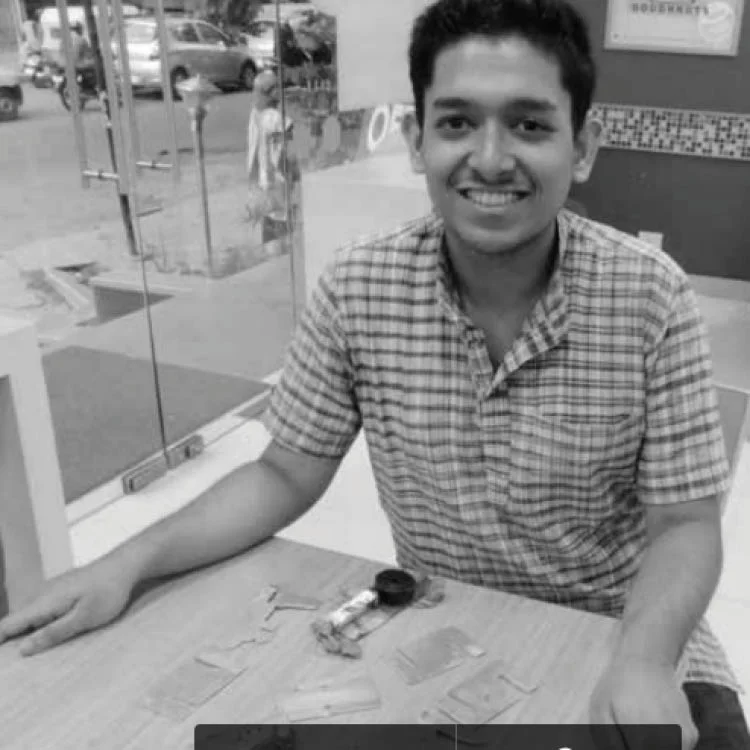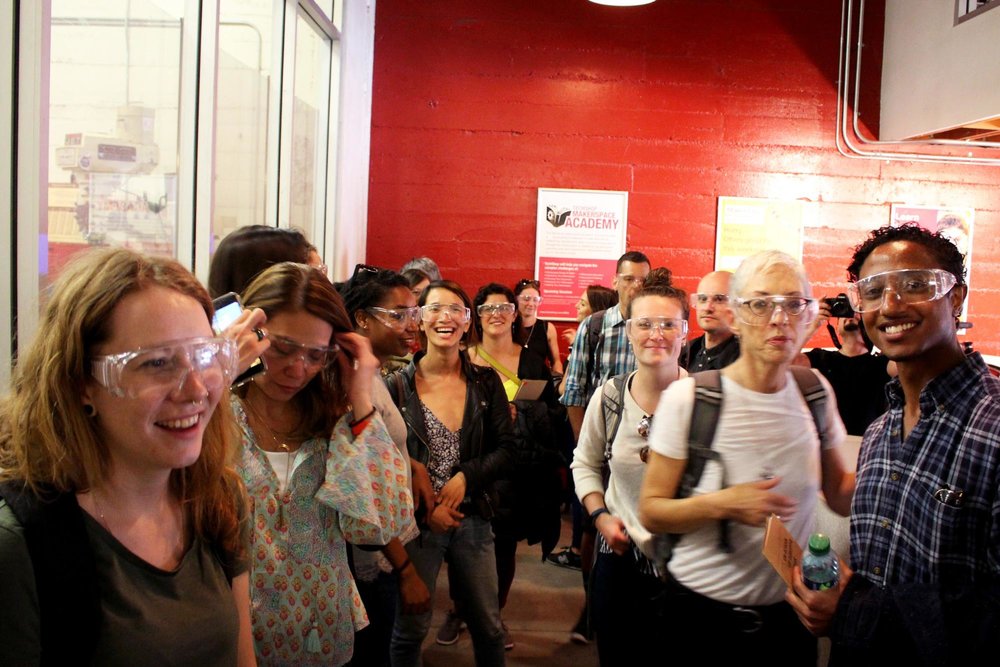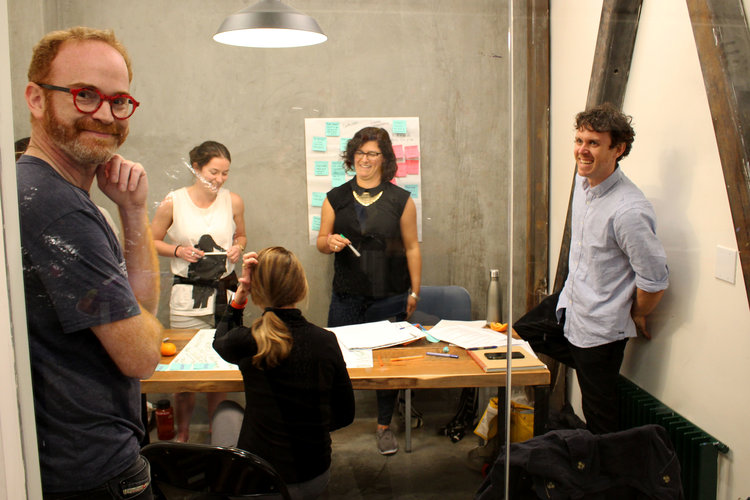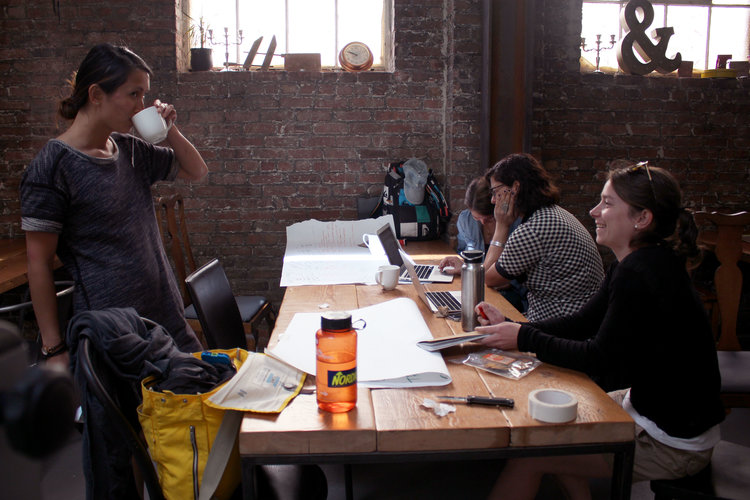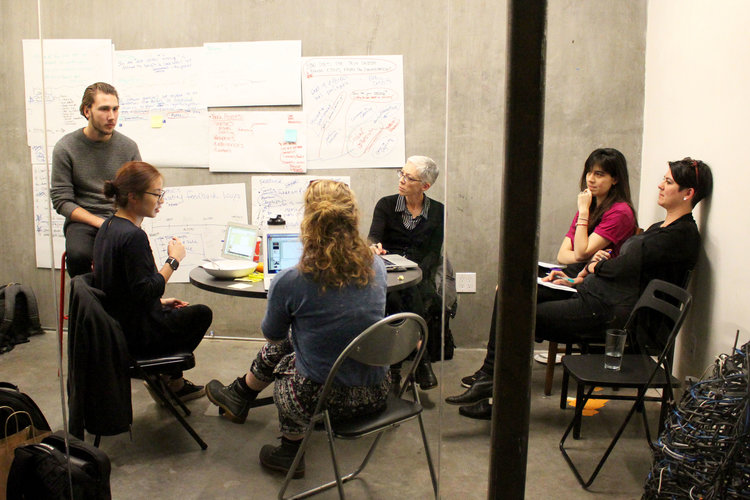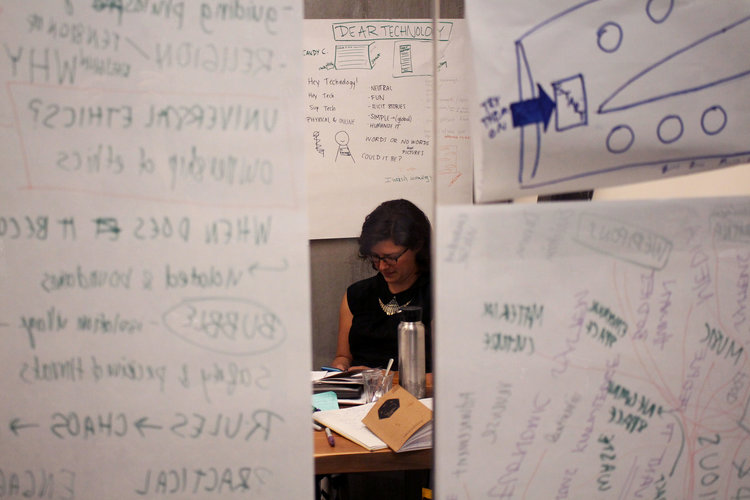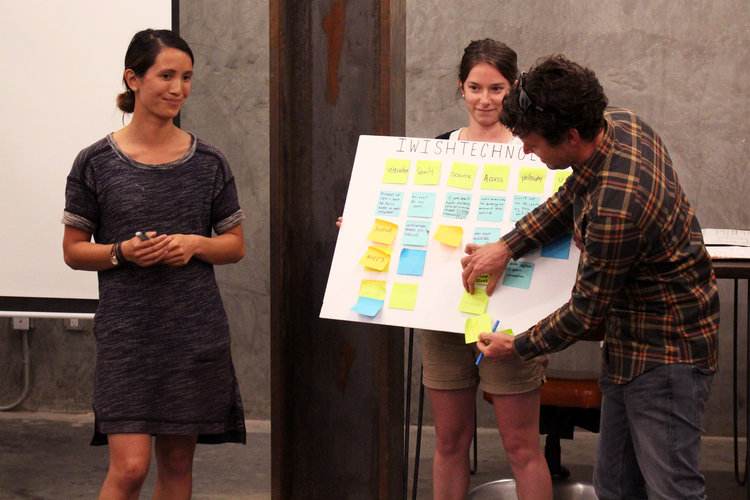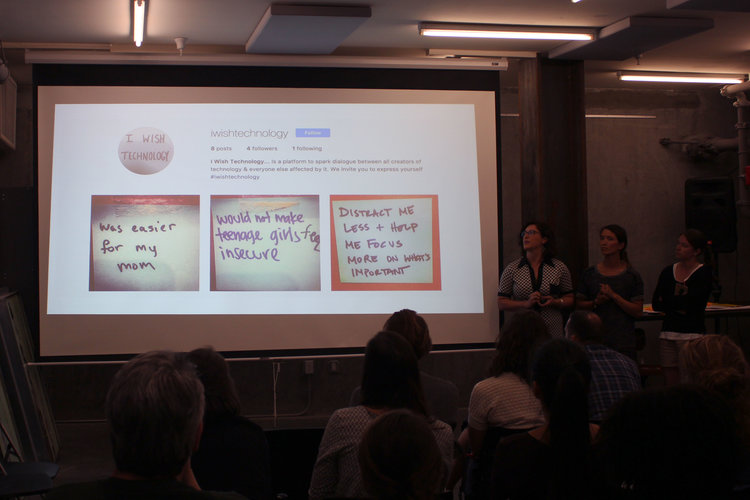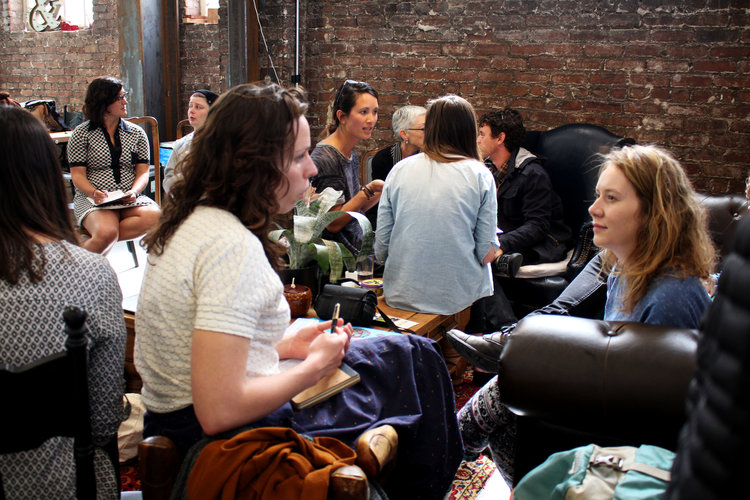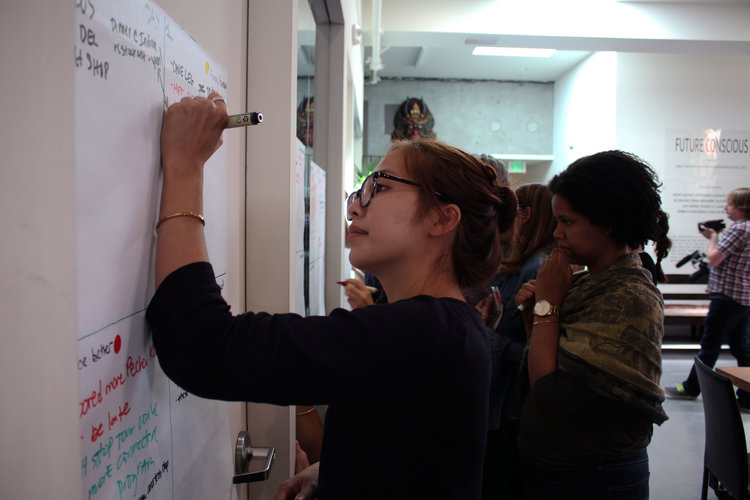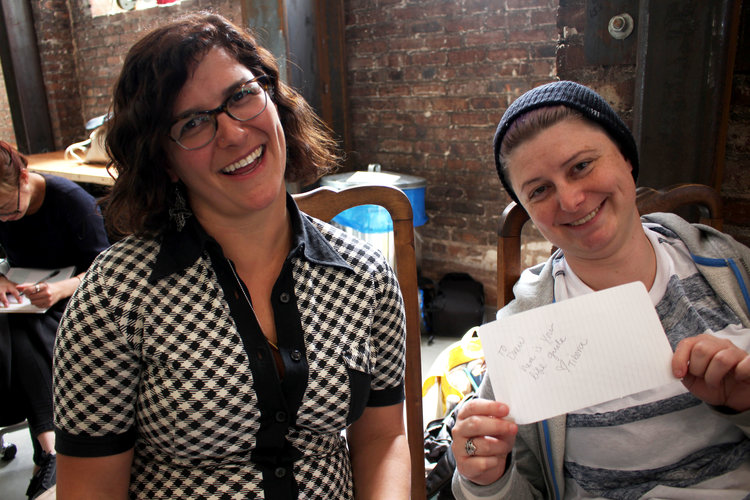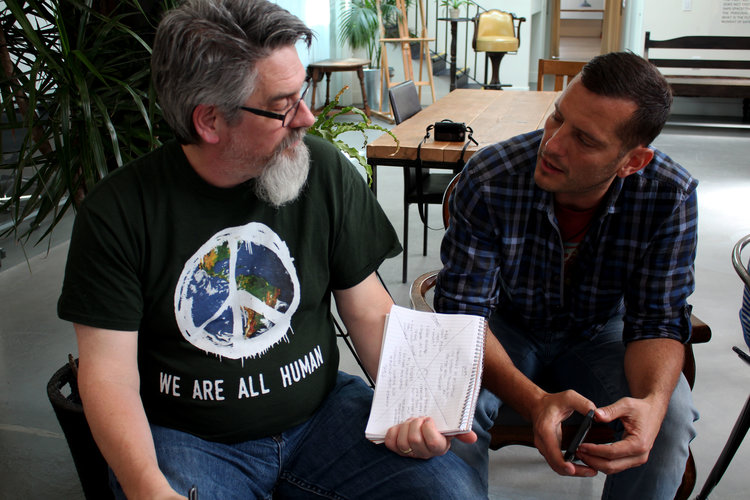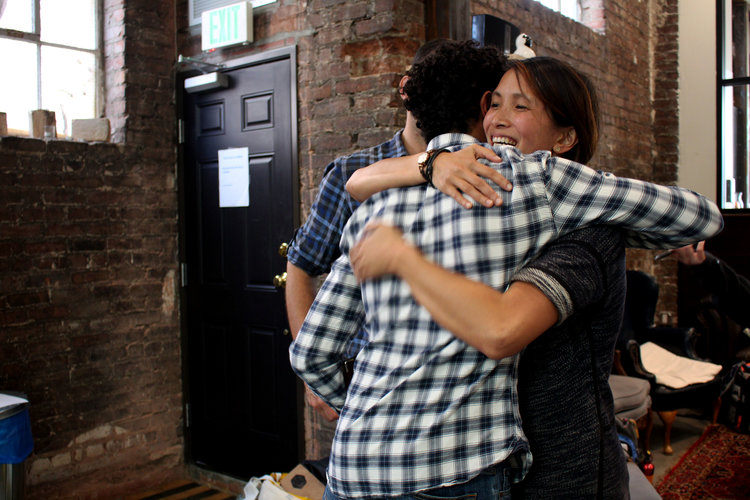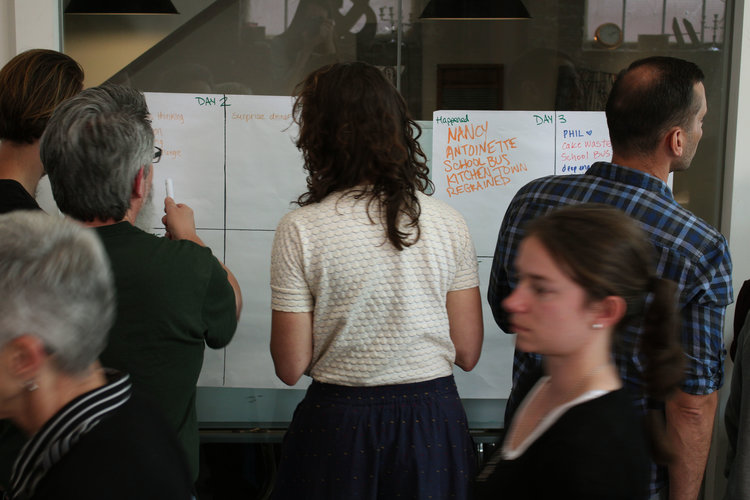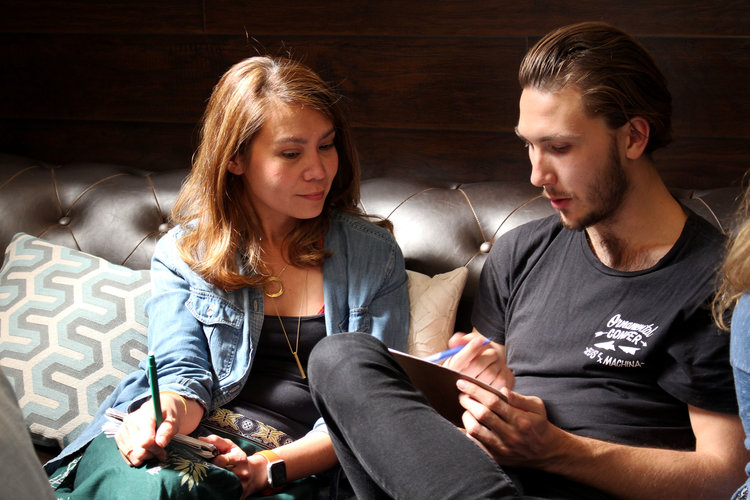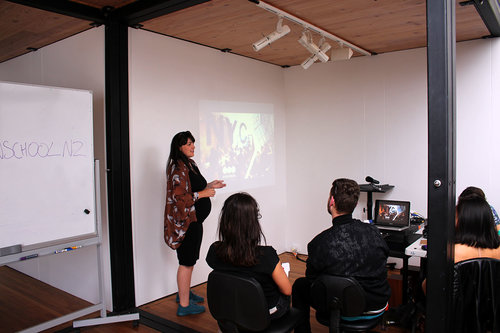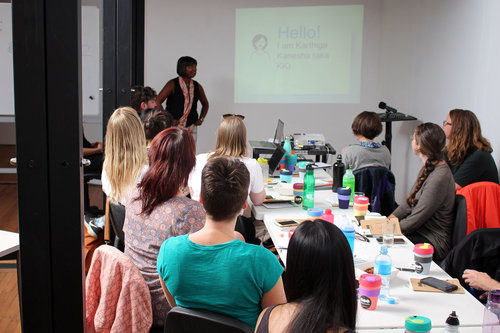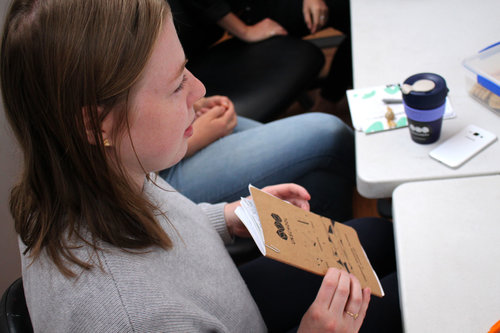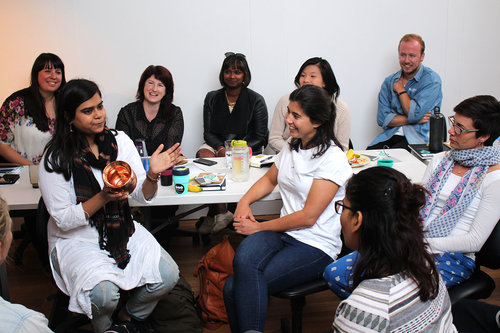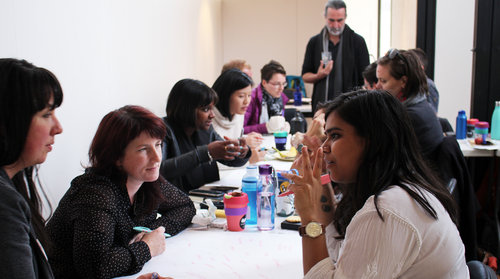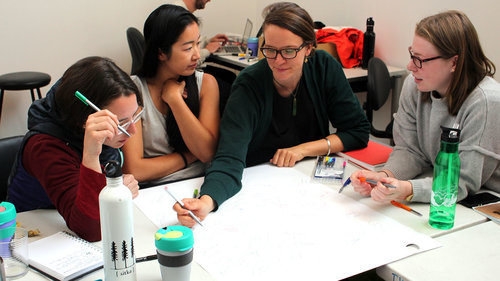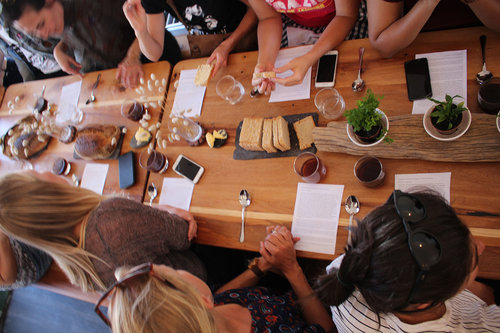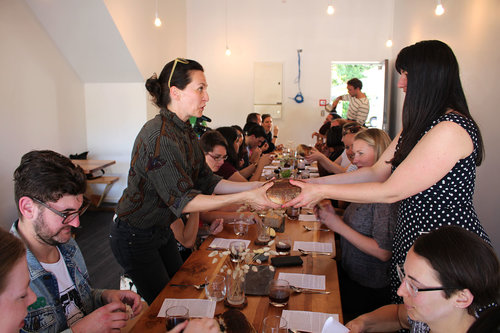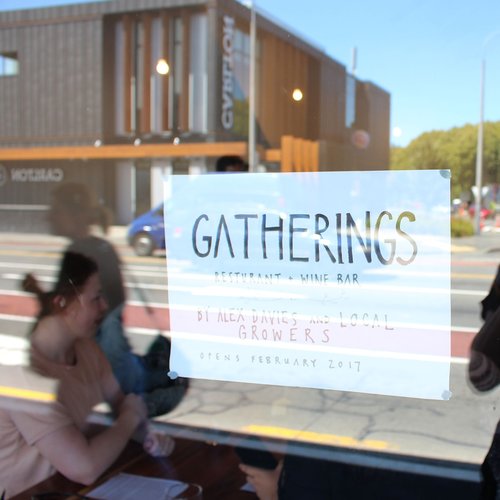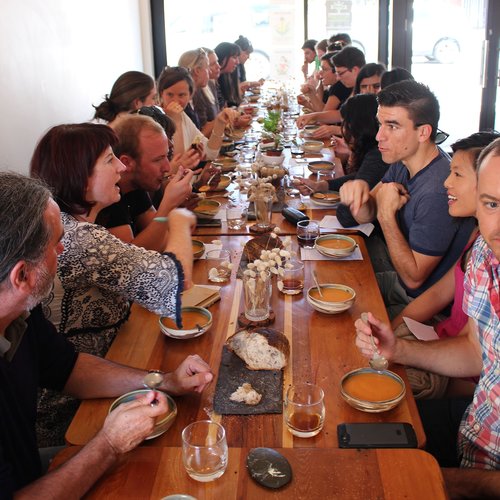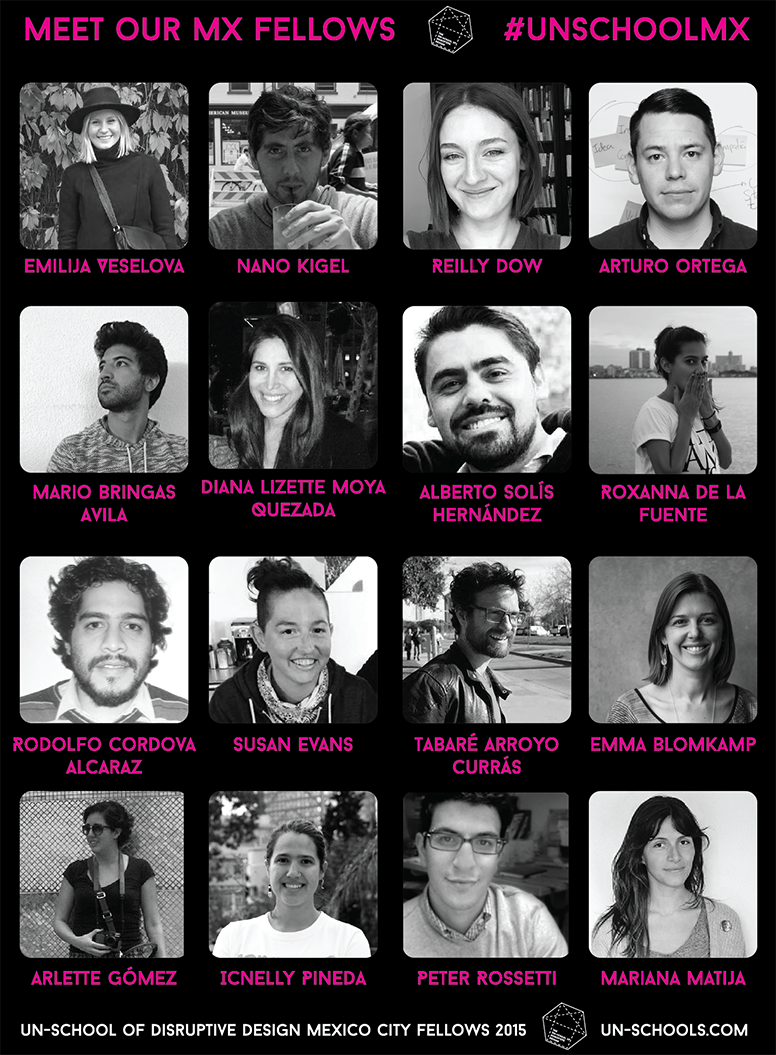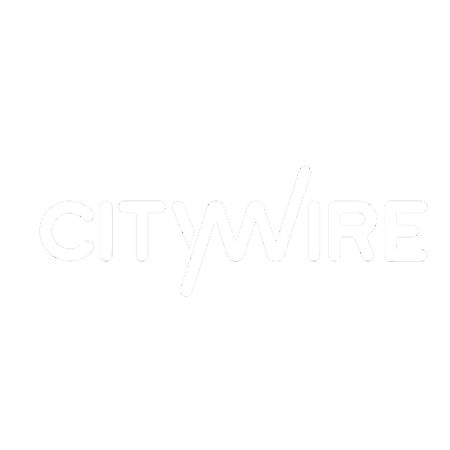UnSchool Fellowship Number 10 happened in Kuching, Malaysia on the island of Borneo between the 17th and 23rd of November, 2019. The Kuching cohort included seventeen fellows from nine different countries (meet them here).
Our Kuching Fellows, Mentors and UnSchool team
DAY ONE: Sunday 17th November 2019
Day one kicked off with us meeting just after noon at the Square Tower on the Kuching waterfront. Thanks to the incredible tropical weather, we hid in the shade against the back of the tower until everyone arrived. There was excitement in the air as Leyla kicked off the fellowship week by welcoming everyone and introducing us to Jacqueline (Jacky) Fong, a local entrepreneur who volunteered to take us on a very charismatic walking tour of Kuching and share her insights in to the history of the beautiful Sarawak region.
Using her own hilarious version of the story, Jacky made it clear that we were lucky to be in a city with over 30 different ethnic groups proudly celebrating their traditions. We learned some of the history of Sarawak, the story of the ‘white Rajah’ who ruled the region for over a hundred years in the 1800s, as well as the natural resources that have fueled different people coming to the beautiful biodiversity hotspot that is the island of Borneo.
The one legged stand is a cognitive trick that helps you remember names!
It’s an UnSchool Fellowship tradition to get to know each other with the one legged stand for everyone to introduce themselves! Despite our sweatyness in the tropical heat, we all got to discover and remember each others names before we jumped on a small wooden ferry boat to cross to the North side of the city. Once docked, we walked through 14 villages, for which our producer Nisha had previously requested permission from local leaders to ensure we were respecting the space and tradition of the area.
In Kuching, we added boats to our list of ways to get around a city!
With many surprises lying along our walk, we arrived at an abandoned old school to find our first mentors, creative punk activist group Pangrok Sulap, who had set up a renegade art exhibition inside the school for us to experience their amazing artworks. Hanging from the remains of the building, we saw incredibly detailed woodcut prints depicting stories of the past, present and future of Borneo.
Rizo, Freddy and Bam from Pangrok (meaning Punk Rock) Sulap shared their history of being musicians turned into creative actionists who co-create community artwork to depict stories of social change. They walked us through their collaboratively designed pieces, sharing the process and story behind each image.
Each image is created by listening to community stories, and collaboratively engraving them into woodblocks to print with the community they belong to, keeping these stories and histories alive through co-created art.
The next stop on our walking tour took us to the Fort Margherita museum (named after the wife of the Rajah, who built it in honor of her) which helped us understand more about the complexities of the region.
The museum houses the history of the Brooke dynasty, and the guide shared how the ‘White Rajah’ James Brooke arrived in Kuching in the 1800s and took over the area on behalf of the Sultan of Brunei. Later, Japan occupied Borneo during WW2 until the war ended and the Brookes ceded administration as a British Colony. In the 1960s, the island of Borneo was consolidated with Brunei, the Indonesian side of the island, and Malaysian regions of Sarawak and Sabah.
After the fort, we headed back over the river for much needed iced tea and coffee at The Granary to hear more from Pangrok Sulap. They shared more details about their work and process, describing how they get invited into different communities to co-create these woodblock stories with the people who live there. They make political statements to create and help effect positive change, and shared the incredible power of well told stories communicated through art, which is now shown around the world.
Nisha joins the rapid fire story-telling as we get to know each other through Pecha Kucha style talks.
The rest of our sweaty afternoon was spent getting to know one another in UnSchool tradition, a 3-minute adaptation of the Pecha Kucha format! Once everyone had a chance to tell us about themselves, why they came and what they wanted to get out of the week, including the educators (Leyla and Emma), two UnSchool Alumni co-hosts (Zoë and Valentina) and local hosts (Nisha and Lymun), we all felt energized by the incredible individuals we would learn from over the week.
Using that energy (and a round of cold drinks to keep us all refreshed) Leyla kept up the pace of the day with an super speed introduction to sustainability and the need for perspective shifts around how we interact with the world around us in order to achieve a sustainable and regenerative future. Bonding in our mutual sweatyness (being monsoon season and all!), we enjoyed our first dinner together at a local restaurant on the waterfront, specializing in the history of the region through food. Just before we headed home for a much needed shower and sleep, we all caught the very expensive (thanks for the info Jackie!) but high energy light show on the Kuching River at the base of the Sarawak State Legislature building which was a great way to send everyone off the first night.
The Kuching Waterfront Darul Hana Musical Fountain projecting onto the Sarawak State Legislative Building
DAY TWO: Monday 18th November 2019
Day 2 kicked off at our our home for the week, the Borneo Laboratory, a creative co-working space where outside and inside spaces merge with projects from artists featured all around us for inspiration.
Our beautiful home for the week
Using your brain takes a lot of energy, so the fellowships are always well nourished, starting with breakfast. We had tried to start the day with vegan buckwheat banana pancakes, but they didn’t turn out quite as planned… using all our creative food skills, we redesigned morning pancakes into banana bread for afternoon break time! Breakfast was even more fun as the fellows shared something they’ve brought from home - most of which happened to be edible treats!
Tiffany shares her crackers and coffee snack, which is enjoyed by the Chinese Malay
If you’ve visited our website, you’ll have discovered the Disruptive Design Method and know that it’s critical to start issue exploration by mining for information and learning to love the problem. Therefore, the first few days of the fellowship are packed with experiences and sharing by the mentors.
We therefore dove right into with an interactive session on systems thinking and learning how to apply these tools to any problem at hand. Experience is always the quickest way to get to understanding, so the fellows split into groups to discover the power of systems mapping with low tech pens and paper. This fun and accessible systems mapping activity is a great way to bypass assumptions, gain new perspectives, and explore the messy reality of the interconnectedness of everything!
Groups getting into their systems maps
The small teams showing the insights they gathered from systems mapping
After the maps were shared and insights on feedback loops, systems dynamics and archetypes was shared by Leyla and the group, mentor Steve McCoy joined us to deliver an insightful session after lunch on differing perspectives on the business case for sustainability and the power of language. He then challenged the group to think through multiply complex perspectives of issues like palm oil production and deforestation. One of his key points is that addressing these issues is not just about trying harder - we need to imagine what good looks like, rather than what is less bad.
Steve McCoy talks language, culture, identity, and solving that palm oil problem once and for all.
After a short break to stretch legs and refill our teacups, the groups were challenged to explore Life Cycle Thinking by looking at an everyday product that uses palm oil as an ingredient (spoiler alert: there are so many!). The teams each identified one, then looked at its impacts across the five main life cycle stages that a product goes through. The groups then shared what they found on Nutella, Oreos, peanut butter and liquid detergent.
Thinking through the life cycle of Nutella
Presenting the outcomes of the life cycle thinking activity
Steve then challenged the groups to, in 30 minutes, try to solve the problem of palm oil! Building on the day’s experiences, they came up with some rapid ideations that built on the day’s insights: reframing the problem is key as there is power in reframing a narrative to raise awareness, banning palm oil products is not the solution as while there are many many (many!) negatives to deforestation, certain people do have some benefit (e.g. farm owners who are able to send their children to university, who otherwise would not).
We like to keep the pace fast in the fellowships, however also value the importance of taking a step back to reflect on what we’ve learned. One of the key duties of the cohosts (who are always previous alumni who want to learn more) is to create a space for reflection at the end of almost every day. This reflection was designed to communicate the purpose, check in with how everyone was feeling, and playfully rank how much each person felt they knew about the topics that had been covered that day.
Our dinner location
With such an inspirational group of Malay mentors with us for the week, we made the most of our time together by having a mentor dinner. Earlier in the day, the fellows put their names under six topics (community, food, waste, systems, economy and creativity) and on arriving at LePau restaurant (meaning farm-hut) they were matched with the mentor connected to the theme for the evening. There’s nothing quite like bonding over a meal, especially with new experiences for many of the group like fermented durian and sweetleaf! The dinner showcased the traditional recipes of Sarawak and surrounding area - while being 100% vegan too!
Mentors and fellows got to spend some quality small group time together
Look at all those delicious green things!
DAY THREE: Tuesday 19th November 2019
At the UnSchool, we love adventure! And what’s more adventurous than starting the day with a reality cooking show style challenge in a fresh food market, to get all the things on a seemingly random list of ingredients? The teams that were lucky enough to have local fellows in their group had a leg up with some of the perhaps less familiar ingredients for those not from the area.
Once the groups were made, each person randomly selected notes of money from a hat and there was much excitement to discover what was pulled out and how much they would have to spend. Everyone then had 20 minutes to go and find their ingredients - while being 100% zero waste! The team brought along some extra items to help, such as reusable containers. Instead of being a competition with each other, they were challenged to work as a group to make sure we had everything we needed - they could share the money resources to collaborate, which meant that within minutes people were sharing money and helping each other get what they needed to complete the task.
Some of the market haul the fellows gathered, ferns from the forest, sweetleaf, and other ingredients to go into our lunch together
The zero waste shopping challenge went down very well with the market vendors!
The seemingly never ending stalls of fresh colourful fruit and vegetables from the forest and farms nearby
We met back at Borneo Lab for our next mentor session with Chris Perry. He shared with us his projects building an edible park, spending time talking about the way to invite people into an experience, the power of aesthetics, mechanisms, community, fermentation, and the compelling role of narrative when it comes to making change.
Chris Perry builds beautiful, growing, educational experiences.
Once Chris had shared his powerfully insightful experiences, the fellows received part 2 of their cooking show challenge! They came downstairs to see 4 cooking stations and a beautiful table full of the colourful, local and delicious ingredients they had found in the morning. We all then had 1.5 hours to collaboratively cook a beautiful, delicious, 100% vegan meal with the bounty, much of which came from the nearby forests and farms.
Chris was the master chef director taking the lead, guiding 17 people all collaboratively cooking a big multi dish meal packed with nutrients, powerful plant protein, and well designed presentation featuring edible flowers. Prepping stations including chopping, beverages, sauces and cooking, all contributing to the creation of a beautiful and delicious spread of colour and according to one of our local fellows Hani, “there was nothing on that table that was not good!”.
The day just kept getting better after we had devoured absolutely everything on the table and our bellies were filled with delightful fresh green dishes. Maynard Keyne Langed from Bad Cat Borneo arrived next, and provided a very charismatic history and tasting of Tuak - a locally made alcoholic drink made from fermented glutinous rice, often made at home in communities around Sarawak. He brought us several flavours to try, from roselle (hibiscus flower), pineapple, smoke and even a black pepper version - which made a big splash, and definitely gave us an afternoon wake up, while learning how to properly cheers Sarawak-style!
The history of Tuak and local fermentation
Ooooahhh! Taste testing the delicious flavors!
Now more awake than before, the afternoon continued with exciting knowledge shared by mentor Carolyn Joan Lau from Zero Waste Malaysia and Tak Nak Straw. Carolyn kicked off her session by sharing her story from landscape architect to waste upcycler to zero waste advocate and creative challenger.
Mentor Carolyn inspiring us
Carolyn then challenged the group to go out onto the streets, find single use plastic trash and intervene in it in a way that would bring a different awareness to the problem. Fellows got very creative making “pick up your trash signs” out of trash! Once they returned to the lab, they were then invited to make things out of collected waste and design a communication meme to challenge others to think differently about this ever increasing issue.
During the reflection session, fellows said that they really enjoyed playing, and using their hands to explore the problem from a different perspective. Everyone was then released for a free evening, where most of the fellows ventured out into downtown Kuching for a shared meal and to soak up the energy of this incredible location.
DAY 4: Wednesday 20th November 2019
Ramping up the adventure level a few notches for a field trip day is easy when you’re on the third largest island in the world and home to one of the oldest rainforest on the planet. We met early at our home base to board a bus heading out to the Matang Wildlife Reserve. On the way, Leyla challenged the group to do an observational research activity to support the perspective shifting tools we use to more deeply understand the world around us. After a quick bus exploration of research strategies and ethics, we arrived for part one of our field trip day.
Meeting our guide Dominic and hearing about the rehabilitation center
Arriving at the nature reserve, we were met by our guide Dominic who explained that we were in a rehabilitation center for rescued Orangutan and Sun Bears; many of which have been confiscated from traffickers and from people keeping them illegally as pets. He took us on a walk to meet the animals, which tested many of us in the group’s emotional state. We met several Orangutan (Peter and his other friends), and other animals like Civets, Gibbons (one threw poop at us!), Bearcats and Sun Bears, along with latex trees, pitcher plants, rattan vine and the rest of the eco-system that makes up this rich and fertile rainforest.
The centre is over 25 years old and due for an upgrade which will apparently be happening next year with government funding. Over the years the centre has rehabilitated and returned 18 Orangutang to the wild, and are hoping to double their capacity as deforestation continues to escalate the issue.
After a much needed snack and mental break at the picnic area, we dipped into the lovely rainforest river for a swim to cool down and make sense of everything we had seen. Once our fingertips had turned to prunes, we moved to one of the sheltered spots for a group check-in. Collectively we shared some mixed feelings that had been triggered by the animal experience, and some more positive experiences from those in the group who had never had to opportunity to be in a rainforest before. Dominic was kind enough to sit with us and respond to our many questions about the animals and the reason why this situation was so bad for them here in Borneo. After a one-on-one X-Map reflection session around the complex issues being discussed, we were ready to move onto the next part of this thought provoking day.
Leyla facilitating a group discussion about the morning’s experience
By mid-afternoon, we were back on the bus heading to our next surprise location. After a short rest, Leyla and Nisha jumped up and managed to run a game with those who were awake on the moving bus, exploring the tool of Gamification using the example of Rimba - a game that Nisha and Lymun developed to cultivate a love of animals indigenous to Peninsula and Borneo, Malaysia. In our reflection later, we were floored by the retention of information from that session - obviously teaching new knowledge on a bus is a good idea! It’s also a great way of distracting the passengers from the monsoon conditions outside, and the bumpy winding road!
Our destination was well worth the journey there - we had arrived at the Kampung Panchor Hot Spring. The beautiful natural hot spring is managed by the local Dayak village, the tribe whose name you might recognise as the area where Operation Cat Drop was done in the 1950s! As we arrived to learn about this type of community enterprise, the monsoon rain pounded down adding an extra element of magic while the group sat in the natural hot springs and soaked in the rainforest around us.
If it wasn’t for the hunt for more food, we could have stayed in the magical jungle hot spring forever. But we all wanted to eat after a long day, so we dried off and boarded the bus to head back into the city. Sounds like the end, right? Not at the UnSchool! Rather than a reflection session, Valentina and Zoë challenged the fellows to practice what they had learned in the day - to design a game. They were asked to self organise into four teams and randomly given folded pieces of origami papers with their parameters for the game design. Each group was given a theme (empathy, curiosity, tourism or social norms), a medium (board game, card game, nontraditional experience or an app), and a target age group (children, teens, adults or elders).
Working on the gamification mini challenge over dinner
The challenge excited the participants and kept the energy levels high and the hungry feeling distracted, until we reached an Indian restaurant who was able to bring out food for all 28 of us (including mentors Steve and Chris) in less than 15 minutes. We were so impressed and grateful to be enjoying the delicious vegetarian delights while brains were active in putting the finishing touches on their games. They only had until 10pm to post their rapid prototype in the group chat. All groups were successful, and a jam packed day 4 was closed while very sleepy people heading to bed.
DAY 5: Thursday 21st November 2019
A great breakfast was made greater with with local fellow Hani contributing some delicious coconut, red bean, mushroom or garlic buns, and then we dove right into hearing the groups pitch the games they had designed the night before.
Team one made a board game for kids created to provoke curiosity, building on different levels to free Peter the Orangutan by solving puzzles. Team 2 developed a card game for adults around ecotourism, with the goal to score the lowest on carbon emissions from a trip by making considered transport, accommodation and diet choices. Team three combined teens and empathy to build a non traditional experience called Rumba Room, with levels depicted experiences relating to plant and animal biodiversity, deforestation, and caged animals. Team four had a tricky one - elders, social norms and an app - but they creatively came up with Generational GApp which gamified challenges of social norms for elders to play with other people in their communities, scoring points for rewards.
Dr Welyn Jeffrey Jehom, an anthropologist from the University of Malaya in Kuala Lumpur, joined us as our final mentor for the week. She had initially wanted to be a fellow, but she was a perfect fit as a mentor, sharing her decade long social entrepreneurial work here in Borneo! Wanting to make sure she adapted her talk to the group and to find out what she had been missing, she asked everyone to recount their favourite moments from the week. It was a simple question that provoked beautiful responses, and even some (happy and grateful) tears!
Welyn’s session focused on research and indigenous knowledge systems, as well as sharing some of the challenges she has experienced working in academia, and also as an entrepreneur. Over the last few years, she’s been supporting a local group of Iban weavers, to pass on the skill to younger generations and create a fair market. She inspired the group through her storytelling of the process of visiting the longhouses and supporting the community in overcoming challenges in getting their incredible works to market. From her talk, we learned about the Longhouses that Malaysians traditionally live in - semi-detached rooms that house a whole family, with up to 120 families living in one Longhouse!
After lunch, we were surprised to discover another surprise! Pangrok Sulap had returned to Borneo Lab, this time with their hand etched wooden boards, some tools and tshirts they’ve made. They created our very own UnSchool wood block print, that were then invited to try our hand at making prints with. We spent the afternoon learning how to create woodcut blocks by collaborating on a communal pieces, and even had an impromptu dance party printing our own tshirts. We sang and danced together, using our feet to press the wood block onto the fabric and paper, with music requests ranging from local to Tina Turner to Metallica!
A collaborative piece was made by the fellows who wanted to try out the cutting process
T-shirt printing is best done by dancing on the woodblock while everyone sings!
Using the last few hours of the afternoon, the group dove into the Disruptive Design Method session in preparation for the challenge, and to fill in any knowledge gaps. Everyone had the opportunity to answer their burning questions (of which Steve had a list of 27!). Knowing the group needed to make the most of their last night off, Valentina and Zoë ran a short reflection session, asking the fellows to share some of the best tips they had experienced in working with groups. The day ended with excitement as the groups for the 24hr Challenge were announced and they were invited to go take some time over dinner to plan the best method of working collaboratively together as a team.
Leyla and co-host Valintina doing the final round up session on the Disruptive Design Method
DAY 6: Friday 22nd 2019
After a delicious roti canai breakfast, Emma and Leyla provided the 24hr design challenge brief with the solution parameters and presentation requirements. Although encouraged to sleep, they do have to go through the full DDM, getting to a solution on the chosen topic that is collaborative, equitable and sustainable.
Having experienced the issues, challenges and opportunities over the week, the fellows are now equipped with the tools to dive into the problem area. They had the choice to pick from, and develop a regenerative and collaborative co-creation design solution to, were:
Forestry use (including deforestation etc)
Coexistence with animals
Palm oil production
Single use plastic proliferation and waste impacts
Supporting indigenous community economic opportunities
The diversification and impact reduction of food
The groups started by deep diving into the topics and the morning hours passed quickly with lots of mining, systems mapping and explorations. Some groups had set hopeful timelines (which they wouldn’t all end up sticking to), while others were just going with the flow. By mid afternoon, energy levels were changing and groups started moving around, getting excited by the ideas falling into place during the landscaping phase.
Getting into systems mapping in the 24 hour design challenge
With the end of the day approaching, dinner took a creative spin on leftovers with a supporting role played by fresh warm naan bread from a restaurant around the corner delivered in a beautiful aluminum engraved tiffin (we have a zero waste food policy and work to stick to it!). The last few hours saw some teams gearing into presentation mode, while others felt lost (and then hopeful - then lost again!) and worked hard into the night to find the form for their ideas. A last shakeup round of feedback from Leyla and Emma saw the teams ushered out into the night, some finding a space to carry on with their projects and some finding the rest that they needed (even if it only started after 1am!).
DAY 7: Saturday 23nd 2019
Leyla explaining how the pitches will go!
Early the next morning, Day 7 kicked off with groups rushing to get their presentations together, jumping right into the practice pitches for feedback with Leyla and the team. Practice pitches are a great way for figuring out where presentations need to refine their storytelling and approach, making evocative and compelling points stick and keeping the audience with you for the whole journey. Lost of feedback and quick edits were made before we went into our official pitches!
Team one started the presentations with a fascinating concept called Mogent (which stands for mobile agentizing of a rural nomadic tribe in western Malaysia).
Team 2 created a playful trailer for a internet based show about ocean conservation, using Nisha our local producer (and the creator of the card game Rimba) as the inspiration for the series. Team 3 provided a high energy pitch for a real live mobile virtual rainforest experience for kids to interact with nature in urban settings to ignite their curiosity and build connections with the nature that surrounds them outside the city. Team 4 ended our pitch session with a fantastic concept called comcom.com (also fun to say!) which stands for ‘community composting’ and shared a system of incentivizing composting in large eating places (LEPs)
During the presentation, each fellow had to opportunity to sit behind one of 4 different perspectives and score the presenting group’s concept based from the viewpoint of either cultural integrity, economic sustainability, the flora and fauna kingdoms or equitable engagement. Mentors Steve and Carolyn were also on hand to provide their feedback as well. The pitches had to show that they were feasible within the sphere of influence, scaleable, and capable of making measurable and impactful positive change.
After the winner was announced, the fellows were surprised by a celebratory drink of either Ribena or Tuak that Barbara had brought from a local supplier. With a few long rounds of 'Oooooooohaa...!’ we celebrated completing an incredible week together. But we still had one final surprise, with our cameraman Eugene announcing that his mom had made us all a special local dish called Lei cha for our last lunch together. This beautiful vegetarian platter of rice, nuts, green veggies and a special 7 secret ingredient tea based soup that you pour over the top was just what we needed to refuel for our last moments of the fellowship - a closing reflection session!
Co-hosts Zoë and Valentina popped up papers on the wall that allowed fellows to walk around and write their memories of the days, the best bits, the stuff that could be improved, funny moments, and the key take homes for them. There was lots of laughter as we all remembered the week and it was all tied together beautifully with a closing circle where everyone shared their appreciation for the people, the program and the shared experiences we had over the week.
And that wraps up yet another incredible UnSchool fellowship adventure! Our 11th fellowship will be in Cochabamba, Bolivia in October 2020 and applications are open now!
Thank you to all our fellows for helping capture the week in photos, especially Eureka Khong, who is responsible fro many of the images shared here!
